India revokes Kashmir’s special status
Updates following India’s revocation of special status of Kashmir, a region also claimed by Pakistan in entirety.
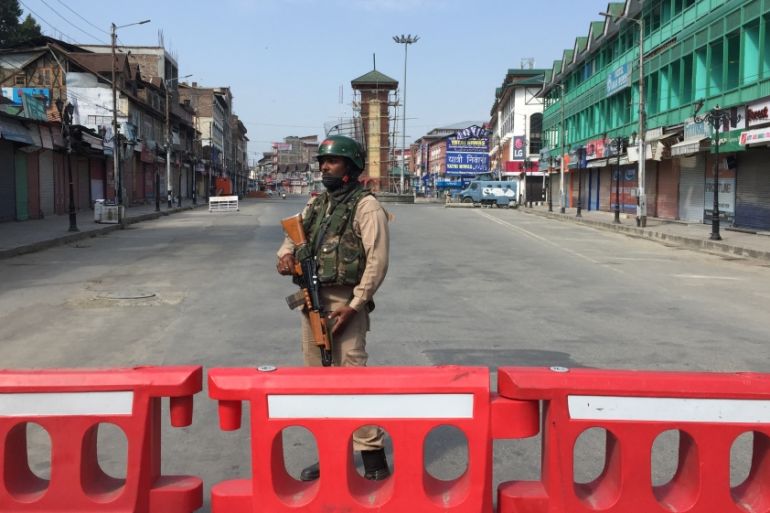
Editor’s note: This is an archived page. Click here for all the latest updates on India revoking Kashmir’s special status.
The Indian government revoked the special status accorded to Indian-administered Kashmir in its constitution, the most far-reaching political move on the disputed region in nearly 70 years.
Keep reading
list of 4 itemsPalestinian Prisoner’s Day: How many are still in Israeli detention?
‘Mama we’re dying’: Only able to hear her kids in Gaza in their final days
Europe pledges to boost aid to Sudan on unwelcome war anniversary
A presidential decree issued on August 5 revoked Article 370 of India’s constitution that guaranteed special rights to the Muslim-majority state, including the right to its own constitution and autonomy to make laws on all matters except defence, communications and foreign affairs.
In the lead-up to the move, India sent thousands of additional troops to the disputed region, imposed a crippling curfew, shut down telecommunications and internet, and arrested political leaders.
The move has worsened the already-heightened tensions with neighbouring Pakistan, which said it would downgrade its diplomatic relations with India.
India and Pakistan claim Kashmir in full but rule it in part. The nuclear-armed neighbours have fought two of their three wars over the disputed territory. A rebellion in Indian-administered Kashmir has been ongoing for three decades.
Sunday, September 15
’20 protests a day’ in Kashmir despite lockdown
Kashmir has seen an average of nearly 20 protests a day against Indian rule over the last six weeks despite a security lockdown to quell unrest, a senior government source told AFP news agency.
Altogether there have been 722 protests since August 5, with the main city of Srinagar, Baramulla district in the northwest and Pulwama in the south being the biggest hotspots, the source said. Nearly 200 civilians and 415 security forces have been wounded, according to the source.
So far, more than 4,100 people – including 170 political leaders – have been detained across the valley, with 3,000 released in the past two weeks, the official said.
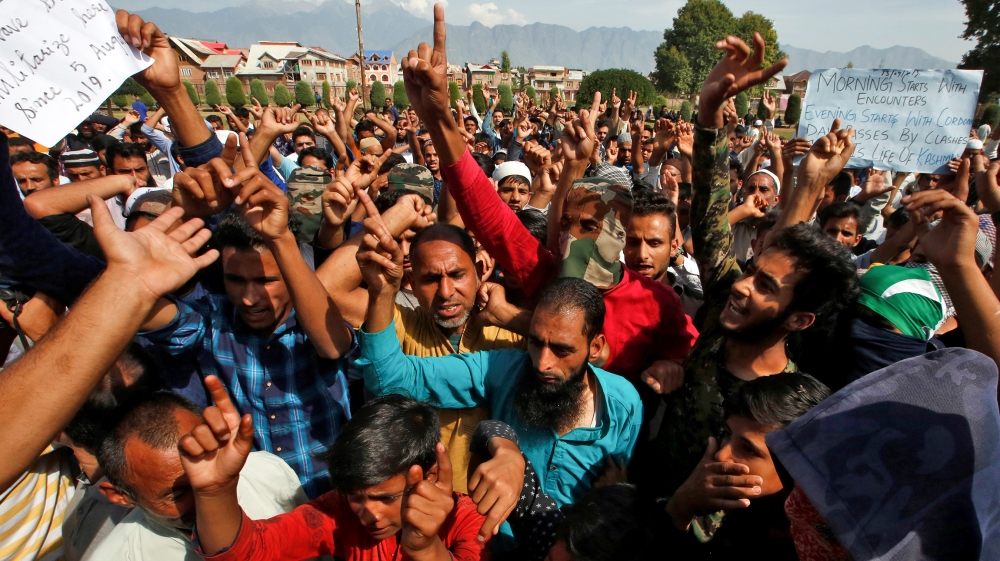
Saturday, September 14
#WATCH Jammu & Kashmir Governor Satya Pal Malik: When I came to take charge of Jammu and Kashmir, Prime Minister told me that make J&K shine so much that people of Pakistan Occupied Kashmir (PoK) wish to cross border, come here, and say 'this is our Kashmir'. pic.twitter.com/uvfPx5XdRB
— ANI (@ANI) September 14, 2019
Pakistan says India fire kills soldier, woman in Kashmir
India and Pakistan have traded fire along their highly militarised frontier in the disputed Kashmir region, Pakistani officials said, leaving a Pakistani soldier and a woman killed. The two nations regularly exchange fire along the so-called Line of Control, which splits Kashmir between them.
Pakistani local administrator Raja Tariq said shelling hit villages in the Nakyal area, killing the woman and wounding six others. Police and local officials said Indian fire in other sectors of Pakistan-administered Kashmir also destroyed a house, partly damaged a school, and hit a shed for cows and goats resulting in the animals’ deaths. Pakistan’s military also said Indian troops opened fire “unprovoked” in the Hajipir sector, killing a soldier.
|
|
Friday, September 13
Pakistan PM holds Kashmir solidarity rally
At a rally in Pakistan-administered Kashmir, Prime Minister Imran Khan said India’s crackdown in Kashmir cannot continue and it may drive more of the world’s Muslims into “extremism”.
“When atrocities get to their peak, people would prefer that death is better than this insulting life,” Khan said in Muzaffarabad. “I want to tell India that, by detaining thousands of people, you are pushing people into extremism,” he said.
Khan said he would raise the issue at the UN General Assembly and “every international platform”.
Read the full story here.
|
|
Gates Foundation criticised over award to India’s Modi
A decision by the Bill and Melinda Gates Foundation to honour Indian Prime Minister Narendra Modi for his campaign to improve sanitation in India has come under fire from activists and members of the civil society, who have urged the philanthropic body to withdraw the award.
The award comes in recognition of the Hindu nationalist leader’s Swachh Bharat Abhiyan (Clean India Mission) programme under which millions of toilets have been built. But activists say hygiene and cleanliness cannot compensate for rights abuses against the minorities in Kashmir and other parts of India.
Read the full story here.
End Kashmir blockade: US legislators in letter to Pompeo
In a letter dated September 11 and tagged in a tweet, Congresswoman Pramila Jayapal in the House of Representatives and Congressman James P McGovern have asked US Secretary of State Mike Pompeo to press the Indian government to immediately end the communications blackout in Kashmir.
The letter says international media and independent human rights observers must be allowed into Jammu and Kashmir “to investigate reports of abuse”. The legislators also expressed concern over the surge in “attacks against religious minorities throughout India” in the letter.
“Multiple reports indicate that over 3,000 people have been indefinitely detained by Indian authorities without any charges, some as young as 11 years old,” the letter said.
Thursday, September 12
Opinion: India’s actions have made Kashmir separatism mainstream
“On June 11, 2010, I came face to face with the sad and violent reality of my homeland, Kashmir, for the first time in my life. I was leaving my tuition centre in the downtown area of the capital Srinagar when I heard shots. Within minutes, panic took over the street and hundreds of students started running in all directions to find cover.
As I looked for somewhere to hide, I saw the body of a young man lying motionless on the ground. He was covered in blood and his eyes were firmly shut. I knew he was dead.”
Read the full article here.
Thousands arrested in Kashmir crackdown: Official data
Authorities in Indian-administered Kashmir have arrested nearly 4,000 people since the scrapping of its special status last month, government data shows, the most clear evidence yet of the scale of one of the disputed region’s biggest crackdowns.
A government report dated September 6 and seen by the Reuters news agency, said more than 3,800 people were arrested, though about 2,600 have since been released.
It was not clear on what basis most of the people were being held, but an Indian official said some were held under the Public Safety Act, a law in Jammu and Kashmir state that allows for detention for up to two years without charge.
Why Saudi, UAE don’t condemn India over Kashmir
Last week, the foreign ministers of Saudi Arabia and the United Arab Emirates (UAE) travelled to Islamabad in a symbolic show of solidarity with Pakistan after New Delhi stripped the Indian-administered Kashmir of its autonomy.
UAE Foreign Minister Sheikh Abdullah bin Zayed Al Nahyan and Saudi Minister of State for Foreign Affairs Adel al-Jubeir held meetings with Pakistani Prime Minister Imran Khan, powerful military chief General Qamar Javed Bajwa and Foreign Minister Shah Mahmoud Qureshi but stayed away from issuing strong words against India.
Read the full story here.
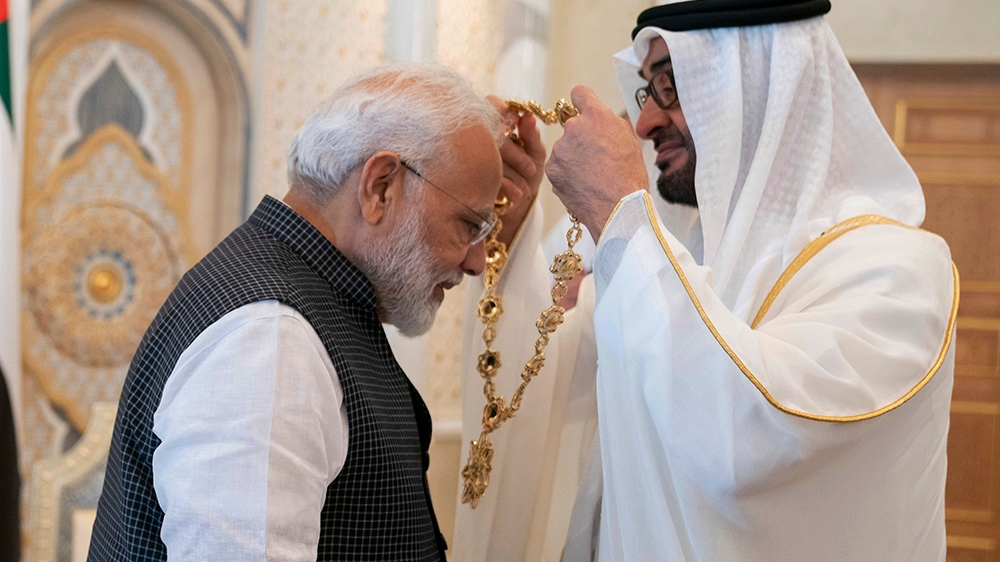
Indian police intercept weapons ‘headed for Kashmir’
Three men suspected of belonging to the Pakistan-based Jaish-e-Muhammad group have been arrested while transporting weapons and ammunition towards Indian Kashmir, police said. Four AK-56 assault rifles, two AK-47s, 6 magazines and 180 rounds were seized, said police official Shridhar Patil.
“The truck was coming from [Indian state of] Punjab and was on its way to Kashmir. We are investigating where exactly they picked up the ammunition from,” Patil told a news conference.
Pakistan’s president asks India to lift Kashmir curbs
Pakistan’s President Arif Alvi has called on India to immediately lift all restrictions on people in Indian-administered Kashmir. During a speech in parliament, he also condemned continued human rights violations in the disputed region.
Alvi’s speech came a day before Pakistani Prime Minister Imran Khan was scheduled to address a rally in Pakistan-administered Kashmir to express solidarity with the people in the Indian part of Kashmir.
Wednesday, September 11
Opinion: Pakistan is no friend of Kashmir, either
“In a recent opinion piece penned for the New York Times, Pakistani Prime Minister Imran Khan asked the world to wake up to the conflict in Kashmir because if it does not, there is a risk of a nuclear war between India and Pakistan. Like previous Pakistani premiers, he sought to present Pakistan as a champion of the Kashmiri cause.
While the world indeed needs to take action on ongoing crackdown and rights abuses in India, it should not overlook the role Pakistan has played in the Kashmiri tragedy. Over the past decades, it has shown little commitment to Kashmiri self-determination.”
More here.
Pakistan sees risk of ‘accidental war’ over Kashmir
Pakistan’s Foreign Minister Shah Mehmood Qureshi has warned that the situation in Indian-administered Kashmir risks sparking an “accidental war”, and urged the UN rights chief Michelle Bachelet to visit the troubled region.
“If the situation persists… then anything is possible,” Qureshi said on the sidelines of the UN Human Rights Council in Geneva, even as he ruled out the possibility of bilateral talks to resolve the tensions.
Pakistan wants a multilateral forum or a third-party mediator to discuss Kashmir, while India insists it is an internal Indian affair.
Suspected rebel behind attack on trader’s family killed
Security forces in Indian-administered Kashmir shot dead Asif Maqbool Bhatt, a suspected member of the Pakistan-based Lashkar-e-Taiba group, accused of attacking the family of a fruit trader, the state police chief Dilbagh Singh told Reuters news agency.
Last week, rebels attacked the home of a fruit trader in Sopore, the region’s main fruit-growing area, for carrying on with his business despite widespread protest boycotts, wounding his son, granddaughter and another family member, Indian authorities said.
Authorities said hundreds of apple trucks have been moving out of Sopore, 45 kilometres from the main city of Srinagar, to deliver their produce to the rest of the country in what they call a “sign of normalcy”.
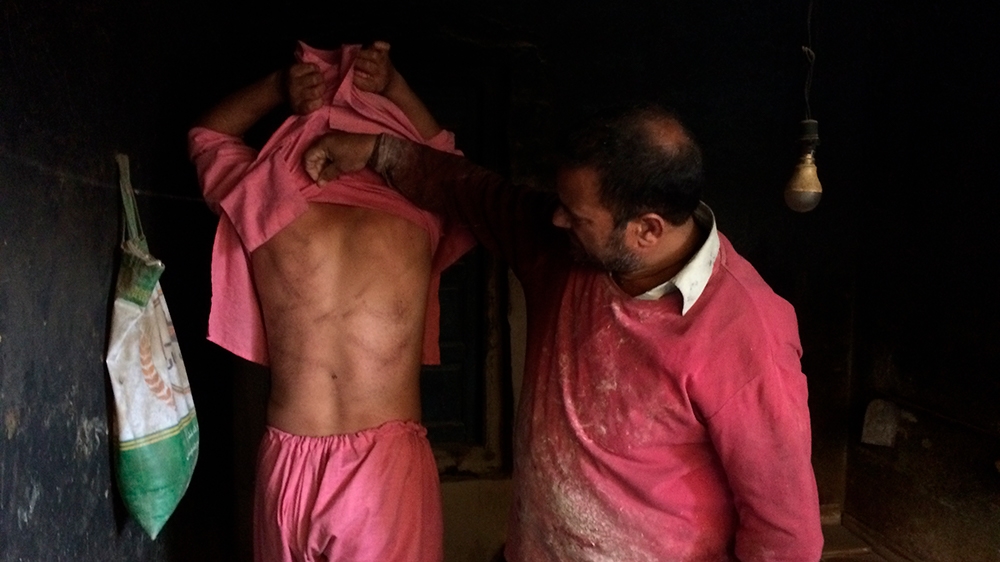
Tuesday, September 10
Pakistan FM warns of accidental war
Pakistan’s foreign minister has warned that India’s “illegal occupation” of Muslim-majority Kashmir region could drive the two nuclear-armed countries “into an accidental war”, while also accusing New Delhi of turning Kashmir “into the largest prison on this planet”.
Shah Mahmood Qureshi, speaking to reporters at the United Nations Human Rights Council in Geneva, accused India of “acting irresponsibly” and “being belligerent”.
“If there is a false flag operation, which we fear, and they use it as a pretext and carry out some misadventure against Pakistan, we will respond and we will respond with force,” he said.
Kashmiris allege abuse by India army
Residents in a dozen villages have accused Indian soldiers of multiple human rights abuses – including beatings and electric shocks, forcing them to eat dirt or drink filthy water, poisoning their food supplies and threatening to take away and marry their female relatives.
An Indian army spokesman in the main city Srinagar, dismissed the accounts as “completely baseless”.
Read more here.
‘Less heated’ tension between India, Pakistan
US President Donald Trump said the tension between India and Pakistan was “less heated” now compared to two weeks ago. He reiterated his offer to help if the two countries approached him.
“India and Pakistan are having a conflict over Kashmir as you know. I think [it] is a little bit less heated right now than [what] was two weeks ago,” Trump told reporters at the White House on Monday.
“I get along with both countries very well. I am willing to help them if they want. They know that the [offer] is out there,” he said.
During a meeting with the visiting Pakistani Prime Minister Imran Khan in July, Trump had offered mediation on the Kashmir issue. But India has refused mediation by a third party.
Monday, September 9
UN rights chief ‘deeply concerned’ over India actions in Kashmir
The United Nations human rights chief on Monday voiced alarm over the situation in Kashmir, pointing among other things to “restrictions on internet communications and peaceful assembly, and the detention of local political leaders and activists”.
“I am deeply concerned about the impact of recent actions by the government of India on the human rights of Kashmiris,” Michelle Bachelet said in her opening statement to the UN Human Rights Council (UNHCR) in Geneva.
Bachelet said she had urged both the countries to ensure that rights in the region were respected and protected. But she said she had “appealed particularly to India to ease the current lockdowns or curfews, to ensure people’s access to basic services, and that all due process rights are respected for those who have been detained”.
Pakistan Prime Minister Imran Khan welcomed Bachelet’s comments in a series of tweets on Monday, and called on the UNHCR to form an independent commission to investigate human rights atrocities in Indian-administered Kashmir.
I welcome the growing concern & demands by the int community, global ldrs, UNSG & UNHCHR, for India to lift its 6-week long siege of IOJK. The Int community must not remain indifferent to the massive human rights abuses by Occupation Indian forces under cover of a brutal siege
— Imran Khan (@ImranKhanPTI) September 9, 2019
Pakistan arrests protesters after pro-independence Kashmir rally
Police have arrested at least 22 people at a pro-independence protest in Pakistan-administered Kashmir after clashes broke out between authorities and demonstrators, according to police and activists.
The clashes took place on Saturday near the village of Tatrinote, about 80km south of the capital of Pakistan-administered Kashmir, Muzaffarabad, and close to the Line of Control that divides Indian and Pakistan-administered portions of the disputed territory.
Read more here.
Sunday, September 8
India tightens lockdown over Muharram processions
Indian authorities have tightened the month-long security lockdown in the main city of Srinagar after breaking up the Muharram processions by mostly Shia Muslims who defied a ban.
Police drove around the city from early Sunday, asking the residents “not to venture out of their homes”. The AFP news agency reported at least two processions with eight to 10 mourners, who were detained and taken away by police, who were also seen hitting the mourners with bamboo sticks.
Muharram, the first month of the Islamic calendar which started on September 1 this year, marks the anniversary of the death of a grandson of the Prophet Muhammad. Most such processions have been banned in Indian-administered Kashmir since an armed rebellion against New Delhi’s rule began in 1989.
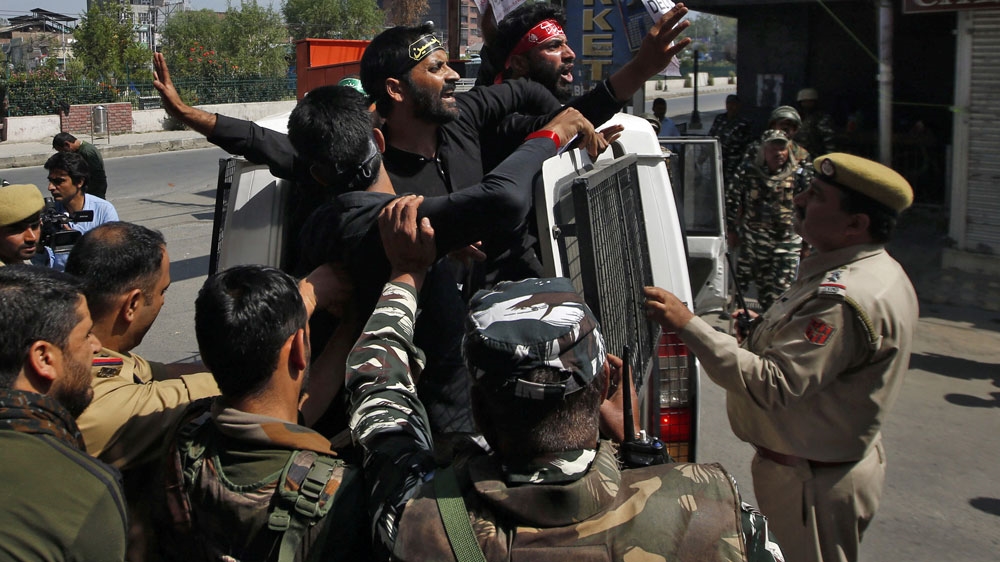
Saturday, September 7
India: Lifting of Kashmir curbs ‘depends on Pakistan’
The lifting of communications restrictions in Indian-administered Kashmir depends on Pakistan stopping deploying “terrorists” and fomenting unrest there, India’s national security adviser (NSA) has said.
NSA Ajit Doval said that “100 percent” of landlines are now working but that a further easing depends on Pakistan, which he said has sent 230 armed fighters into the region.
“Lifting the [restrictions on] communications depends on how Pakistan behaves,” Doval told reporters. “We are determined to protect the lives of Kashmiris from Pakistani terrorists even if we have to impose restrictions.”
India president’s request to use Pakistani airspace denied
Pakistan says it has refused a request by India’s President Ram Nath Kovind to fly through its airspace due to New Delhi’s recent “behaviour”.
“The Indian president had sought permission to use Pakistan’s airspace to travel to Iceland but we decided not to permit him,” Pakistani Foreign Minister Shah Mahmood Qureshi said in a statement, without giving further details. There was no immediate comment by India.
Read more here.
Friday, September 6
Landline phones back, but calls ‘don’t go through’
The administration in Indian-administered Kashmir said landline telephone service has been restored. But people lined up at offices or homes that have landline telephones to try to contact family and friends after the long wait, but many were unable to get through after repeated attempts.
“Our landlines have been restored but we are still unable to talk to people. It is frustrating. I have been trying to call people since morning, but I am not getting through,” said Syed Musahid in Srinagar.
Many Kashmiris living outside the region also said they were having trouble getting in touch with their families in Kashmir. “I kept trying a hundred times to reach my family in Kashmir, and only then did my call go through,” said Bint-e-Ali, a Kashmiri in the Indian city of Bengaluru.
06 Sep, 2019
Statement on FIR against me filed by the Special Cell of Delhi Police
I have learnt from media reports that the Special Cell of the Delhi Police has filed an FIR against me for speaking out on the clampdown in Kashmir and the denial of basic rights to Kashmiris. pic.twitter.com/8GjJzCYo04
— Shehla Rashid (@Shehla_Rashid) September 6, 2019
Chaos and crisis in Kashmir hospitals
For the past two weeks, Mohamad Shafi has been at the bedside of his 13-year-old son Rafi, who has been admitted to the nephrology ward of a state-run hospital in Indian-administered Kashmir’s main city of Srinagar.
Shafi is tired and has hardly had much sleep, but the 54-year-old is prepared to stay at the Sher-i-Kashmir Institute of Medical Sciences hospital for as long as it takes.
Read the full story here.
India throttling Kashmir media, report says
India’s government is muzzling Kashmir’s media as part of the lockdown it imposed on the disputed region a month ago, according to a new report by the Network of Women in Media, India and the Free Speech Collective.
The study said reporters were being subjected to surveillance, informal investigations and harassment for publishing reports considered adverse to the government or security forces.
Titled “News Behind The Barbed Wire”, its findings reveal “a grim and despairing picture of the media in Kashmir, fighting for survival against the most incredible of odds”.
Pakistan army accuses India of ‘state terrorism’
Pakistan’s army chief General Qamar Javed Bajwa has accused India of being responsible for “state terrorism” in Indian-administered Kashmir.
He said the Pakistani military is ready for “every sacrifice” and “will never abandon” the people of Kashmir in their struggle for self-determination in line with UN resolutions.
Bajwa spoke as Pakistan marked the 54th anniversary of the start of the second of the two wars it has fought with India over Kashmir.
Thursday, September 5
Anger, defiance mark a month of Kashmir siege
Haleema had to begin her journey at dawn, travelling through deserted roads from her home in southern Kashmir’s Shopian district to wait at a park outside the central jail in Srinagar, the main city in the Muslim-majority region.
Two hours past noon, Haleema was still waiting and uncertain if she would be allowed to meet her husband, Bashir Ahmad. “He was picked 20 days ago,” she said, “like they pick everyone else.”
Read the full story here.
Kashmiri teen dies of pellet, tear gas shell wounds
When the body of 16-year-old Asrar Khan reached his home in Indian-administered Kashmir at about 2:30am on Wednesday (2100 GMT on Tuesday), wails of his grieving parents shattered the tense silence of the night.
Khan, a student of Class 11, was injured in the head by a tear gas shell and pellets on August 6 outside his home in the main city of Srinagar’s Ellahi Bagh area, according to his family and medical records.
Read the full story here.
Amnesty launches campaign to end Kashmir blackout
The draconian communications blackout in Kashmir is an outrageous protracted assault on the civil liberties of the people of Kashmir, Amnesty International India said, as it launched a global campaign today in a bid to highlight the human cost of the lockdown.
“The blackout has now been a month old and cannot be prolonged any further by the Indian Government as it has grossly impacted the daily lives of Kashmiri people, their emotional and mental wellbeing, medical care, as well as their access to basic necessities and emergency services. It is tearing families apart,” said Aakar Patel, head of Amnesty International India.
Wednesday, September 4
Victims of torture, arbitrary arrests recount ordeal
In a village in southern Kashmir, a 22-year-old man said he was picked up in a midnight raid and tortured for more than an hour along with a dozen other Kashmiris.
“I was beaten with sticks, rifle butts and they kept asking me why I went for a protest march. I kept telling them that I didn’t, but they didn’t stop. After I fainted, they used electric shocks to revive me,” he told Al Jazeera, on condition of anonymity.
Read the full story here.
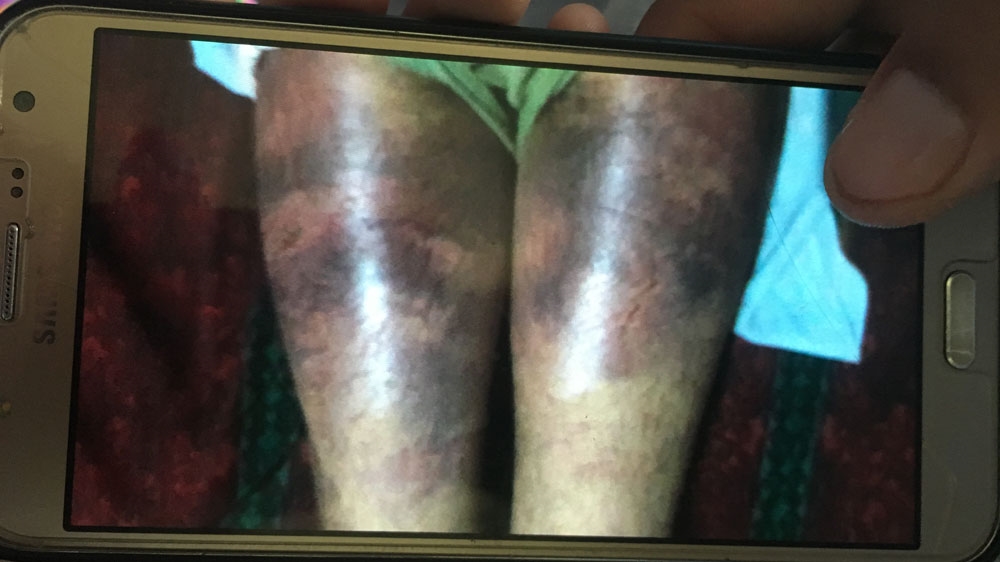
Saudi, UAE diplomats in Pakistan to discuss Kashmir
Saudi Arabia and the United Arab Emirates (UAE) have sent their top diplomats to Pakistan to help Islamabad defuse tensions with India over the disputed Kashmir region. Gulf Arab countries have kept mostly silent on the issue, underpinned by more than $100bn in annual trade with India that makes it one of the Arabian Peninsula’s most prized economic partners.
In a rare move, a single aircraft carried the two Arab diplomats – Saudi Minister of State for Foreign Affairs Adel bin Ahmed Al-Jubeir and UAE Minister of Foreign Affairs Sheikh Abdullah bin Zayed Al Nahyan – to Islamabad in what Pakistani authorities said was a symbolic show of unity. The two diplomats held talks with Pakistani Prime Minister Imran Khan and Minister of Foreign Affairs Shah Mehmood Qureshi.
India names leaders of Pakistan-based groups ‘terrorists’
India has officially declared Masood Azhar, chief of Jaish-e-Muhammad (JeM) and Hafiz Muhammad Saeed, founder of Lashkar-e-Taiba (LeT) as “terrorists” under the amended Unlawful Activities (Prevention) Amendment Act.
Azhar’s name has already been placed by the United Nations on a sanctions blacklist after his group claimed responsibility for a February suicide attack in Indian-administered Kashmir that killed 40 Indian soldiers and brought India and Pakistan close to war. The UN in May imposed a travel ban and freeze on Azhar’s assets as well as an arms embargo.
Saeed, an anti-India scholar, runs a charity in Pakistan known as Jamaat-ud-Dawa. The charity is widely believed to serve as a front for LeT, the group blamed for attacks in Mumbai in 2008 that killed 166 people.
India sowing seeds of war: Pakistan army
The Pakistani army has warned that India is sowing the seeds of war with its action in the Kashmir region.
“The situation in Kashmir has become a big danger in the region … The Indian action in Kashmir is sowing seeds of war,” Pakistani military spokesman Major General Asif Ghafoor told a news conference in Islamabad.
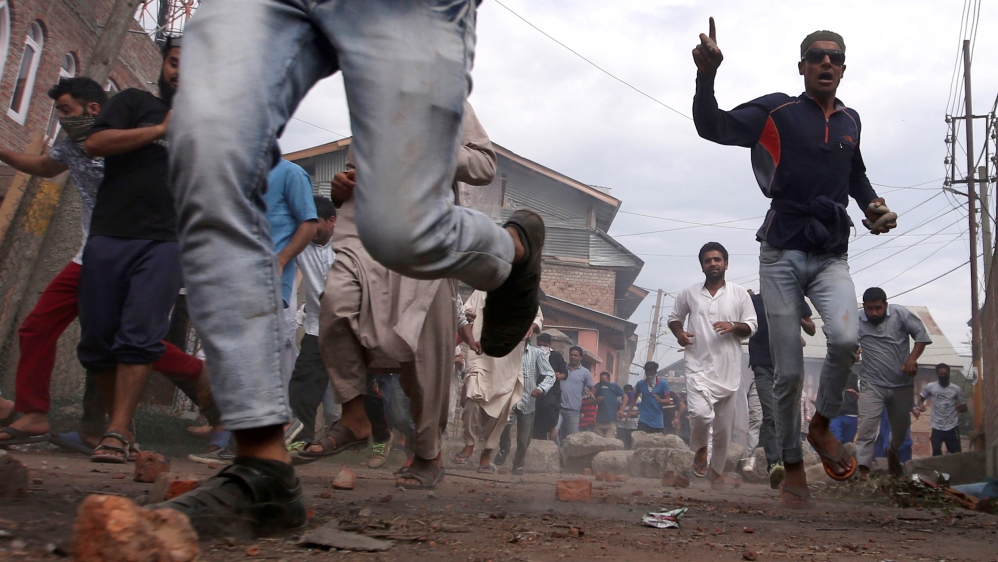
Tuesday, September 3
PM Khan: Will not initiate military conflict with India
Pakistan’s Prime Minister Imran Khan has asserted that his country would not initiate a military conflict with India, warning of the risk to the world of nuclear war breaking out between the South Asian neighbours, as tensions over the disputed region of Kashmir remain high.
“We are two nuclear-armed countries, if tensions rise then there is a danger to the world from this,” Khan said at the International Sikh Convention in the eastern Pakistani city of Lahore on Monday.
Read the full story here.
A month since the lockdown, if the Indian govt is convinced that everything is NORMAL in Kashmir, why are non Indian, foreign journalists not allowed access to the valley. Why are they denied permit to report from Kashmir ?
— Rana Ayyub (@RanaAyyub) September 3, 2019
Sunday, September 1
Thousands take part in anti-India rally in Karachi
Thousands of Pakistani protesters took part in an anti-India rally for a fourth consecutive week following India’s move in downgrading Muslim-majority Kashmir’s autonomy. Protesters held signs, chanted slogans and displayed a large Kashmiri flag during the rally in Karachi, organised by the Jamaat-e-Islami party.
“We demand that the peace mission of the United Nations should visit Srinagar, like how they go to Uganda, East Timor, Djibouti and other countries of Africa,” said Siraj ul Haq, Jamaat-e-Islami party chief, calling on other nations to “take active measures to give Kashmiris the right to freedom”.
Reporting Kashmir amid lockdown, harassment
As the crippling lockdown in Indian-administered Kashmir nears a month, journalists in the region complain of harassment by authorities, with many accusing security forces of deleting their camera footage and a pressure to report “normalcy”.
“This is a unique situation. None of us had seen anything like this in the past. Even in the worst of times in Kashmir, we were able to file our stories,” said Muzaffar Raina as he waited to access his email at a media centre in the main city of Srinagar.
Read the full story here.
Saturday, August 31
|
|
Friday, August 30
|
|
Khan: ‘World can’t ignore Kashmir, we’re all in danger’
Prime Minister Imran Khan, in an opinion piece for The New York Times, said talks between India and Pakistan could only begin if New Delhi reversed its “illegal annexation of Kashmir, ends the curfew and lockdown, and withdraws its troops to the barracks”.
Khan’s piece was published as Pakistan came to a standstill on Friday as tens of thousands poured onto streets in a government-led demonstration of solidarity with the disputed region of Kashmir, after India revoked its autonomy this month.
“I wanted to normalise relations with India through trade and by settling the Kashmir dispute, the foremost impediment to the normalisation of relations between us,” Khan said.
|
|
Imran Khan leads Kashmir solidarity rallies in Pakistan
Pakistan’s prime minister promised to raise the issue of rights violations allegedly perpetrated by India in the disputed region of Kashmir at the United Nations next month, as tens of thousands held protests across the country expressing solidarity with the Kashmiris.
“The whole world should have stood with Kashmir,” Imran Khan told a rally of thousands outside his office in the capital Islamabad on Friday.
Read the full story here.
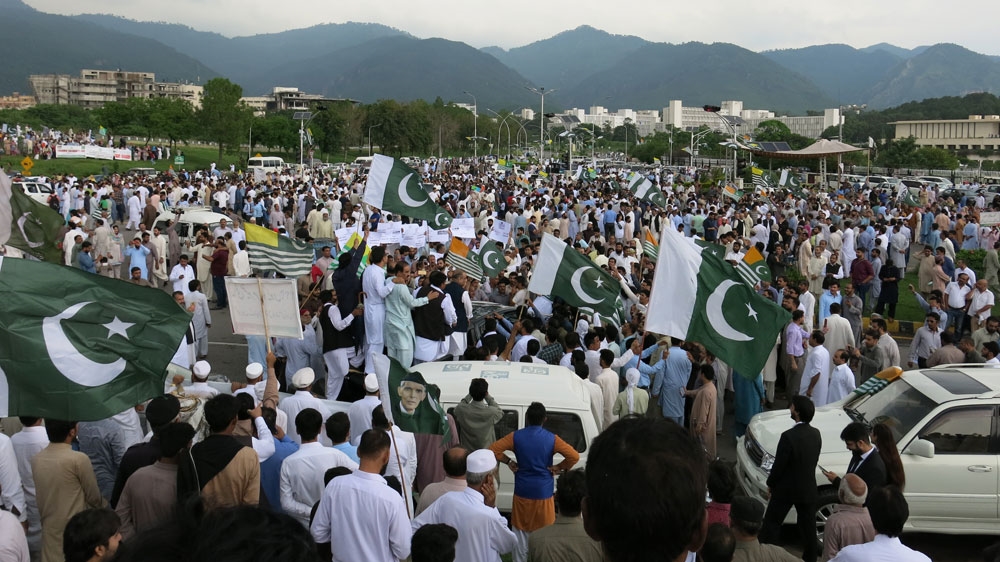
Thursday, August 29
‘Pakistan-trained commandos’ trigger alert at India ports
India’s two main ports said they had been warned by the coastguard and intelligence officials that Pakistan-trained commandos had entered Indian waters to carry out underwater attacks on port facilities.
The Mundra Port, run by Adani Ports and Special Economic Zone Ltd, and the state-owned Kandla Port asked their employees and ship operators to be vigilant, port officials and the ports said, in advisories seen by Reuters news agency.
Intelligence shared by government officials suggested that “Pakistan-trained commandos” had entered the Gulf of Kutch on the west coast to foment violence, the Kandla Port said in an advisory.
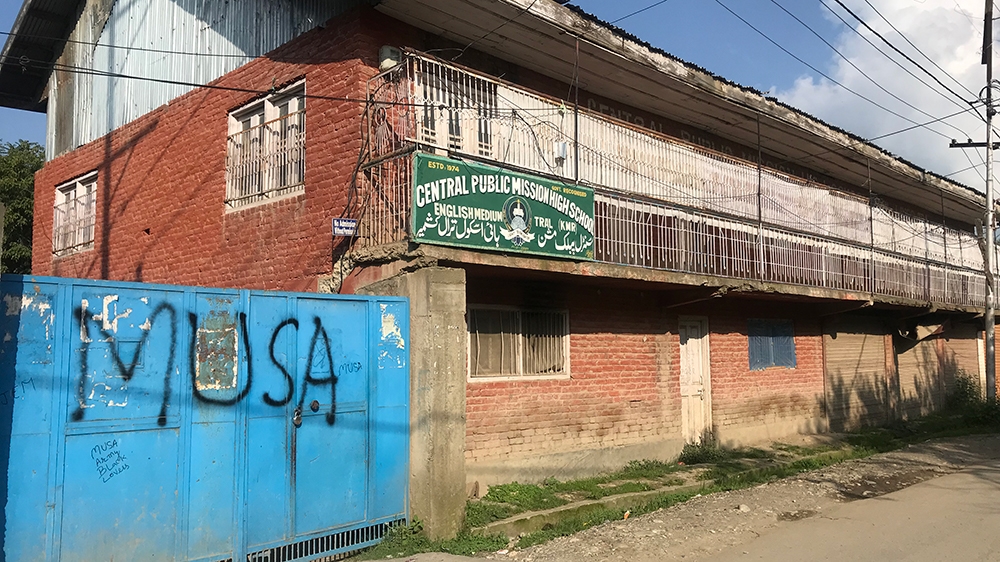
Will India’s crackdown fuel further violence?
As India extends its military lockdown in Kashmir, there are fears that the resistance movement may adopt a strategy of violence to fight against the punishing measures – which include mass arrests, a communications shutdown and alleged police brutality and harassment.
Chants of “one solution, gun solution” have recently resounded at protests in the Muslim-majority Indian-administered region, which on August 5 was subjected to a complete military crackdown after the Hindu-nationalist ruling party revoked Article 370, which had granted Kashmir a degree of autonomy.
Read the full story here.
Pakistan carries out training launch of ballistic missile
Pakistan’s military has successfully carried out a training launch of a surface-to-surface ballistic missile, at a time of heightened tension with neighbouring India over the disputed region of Kashmir, a spokesman said.
“Pakistan successfully carried out night training launch of … missile Ghaznavi capable of delivering multiple types of warheads,” the spokesman for the armed forces, Major General Asif Ghafoor, said on Twitter.
The missile can deliver a warhead to a distance of up to 290km.
The rights of the people of Jammu & Kashmir must not be violated.pic.twitter.com/h045Tz9p6x
— Amnesty India (@AIIndia) August 29, 2019
Enormous hiring drive planned in Kashmir: Governor
Satya Pal Malik, the New Delhi-appointed governor of Jammu and Kashmir, said the central government planned to hire tens of thousands of workers. Malik called it the largest recruitment drive in the region, with officials planning to fill “50,000 vacancies in various government departments in the next few months”.
At a news conference in the main city of Srinagar, Malik also announced that the government was willing to commit $700m to help apple farmers. Indian authorities believe the move will expand the region’s economy, to which horticulture, particularly apple orchards, is critical.
Wednesday, August 28
Pakistan briefs France, Jordan on ‘deteriorating situation’
India’s unilateral actions in Kashmir pose “grave” risks to regional peace and are aimed at altering the demography of the Muslim-majority region, Pakistan’s Prime Minister Imran Khan said in phone calls with the leaders of Jordan and France.
French President Emmanuel Macron underlined the importance of “resolving all outstanding issues through peaceful means”, according to a statement from Khan’s office.
Jordan‘s King Abdullah called for de-escalation and peaceful resolution of the dispute, Khan’s office said. He also pledged to consult other countries over the situation.
500 protests, hundreds injured in three weeks: Report
At least 500 incidents of protest have broken out in Indian-administered Kashmir since New Dehli stripped the region of its autonomy and imposed a military clampdown more than three weeks ago, a senior government official has told the AFP news agency.
The official said at least 500 protests and incidents of stone-throwing have occurred since August 5, with more than half taking place in the main city of Srinagar.
Read the full story here.
India’s top court to examine change in Kashmir status
India’s top court is taking up legal challenges to the government’s decision to revoke Indian-administered Kashmir’s special status and has asked the government to explain its stance to the court.
The Supreme Court held a preliminary hearing on the petitions and said five judges will start a regular hearing in October.
It ordered the federal government to file its replies to 14 petitions and inform the court about the media restrictions imposed in Kashmir.
‘Kashmir India’s internal issue, Pakistan backs violence’
Rahul Gandhi, leader of India’s main opposition party, the Indian National Congress, has said Kashmir is India’s internal issue and Pakistan “instigates and supports” violence in the region.
“I disagree with this Govt. on many issues. But, let me make this absolutely clear: Kashmir is India’s internal issue & there is no room for Pakistan or any other foreign country to interfere in it,” Gandhi tweeted.
There is violence in Jammu & Kashmir. There is violence because it is instigated and supported by Pakistan which is known to be the prime supporter of terrorism across the world.
— Rahul Gandhi (@RahulGandhi) August 28, 2019
|
|
Tuesday, August 27
Pakistan army: Two killed from India fire along LoC
Pakistan’s military has accused Indian troops of firing across the Line of Control (LoC) in the disputed Kashmir region, killing two civilians and wounding three others.
It said in a statement that the dead included a 45-year-old man and a three-year-old girl, while the wounded were taken to hospital.
The Indian fire also burned three homes in the village of Nekrun near the heavily militarised LoC, it added.
The army did not say whether it returned fire and there was no immediate comment from India.
Pakistan considering closing airspace to India: Minister
Pakistan’s Prime Minister Imran Khan is considering a complete closure of airspace to India and blocking Indian land trade to Afghanistan via Pakistan, according to the Pakistani minister for science and technology.
“PM is considering a complete closure of Air Space to India, a complete ban on use of Pakistan Land routes for Indian trade to Afghanistan was also suggested in cabinet meeting, legal formalities for these decisions are under consideration … #Modi has started we’ll finish!,” Fawad Chaudhry wrote on Twitter.
The tweet gave no more details on why Pakistan would be considering the moves against Indian Prime Minister Narendra Modi’s government now.
Pakistan had reopened its airspace in mid-July after almost five months after closing it in the wake of a military standoff with India.
The months of restrictions forced long detours that cost airlines millions of dollars.
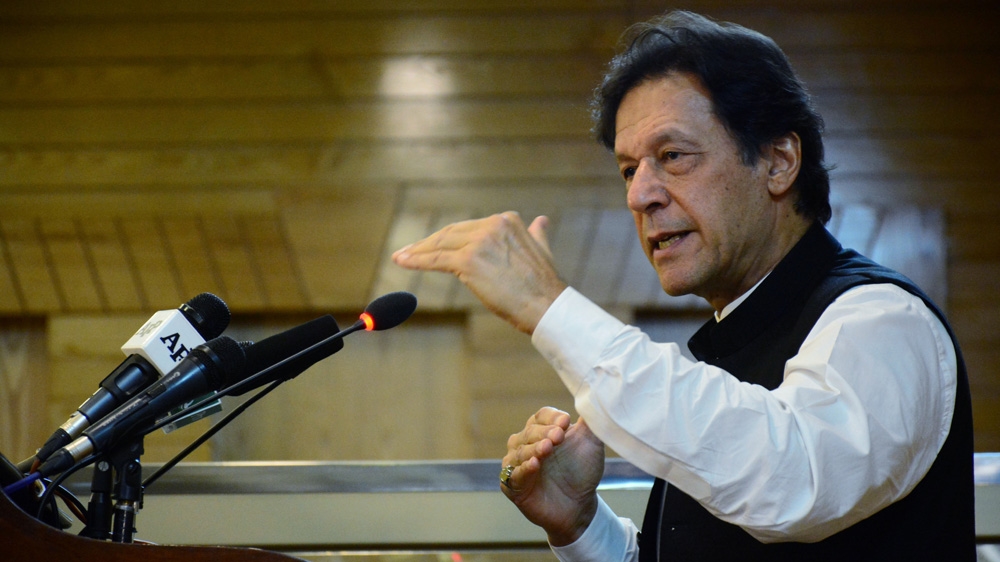
Students rally in Pakistan-administered Kashmir
More than a thousand students rallied in the capital of Pakistan-administered Kashmir to denounce India’s downgrading of the special status of the portion of the disputed region it controls.
The demonstrators chanted “We want freedom” and denounced human rights violations in Indian-administered Kashmir.
Tuesday’s rally in Muzaffarabad came a day after Pakistani Prime Minister Imran Khan vowed to globally highlight the issue of Kashmir. He will address the UN General Assembly on September 27.
|
|
Workers told to leave amid demography fears
Deepak Lal came to Kashmir’s main city of Srinagar in May hoping to find work as a painter. The 23-year-old travelled several hundred miles from his home state of West Bengal in eastern India to the disputed Himalayan region expecting to work during the summer and autumn months.
His plan was foiled when India’s Hindu nationalist government imposed an unprecedented security lockdown in the territory earlier this month, followed by a contentious move to strip the region of its limited autonomy.
Read the full story here.
Monday, August 26
Pakistan FM to have meeting with UAE after Modi’s award
Pakistani Foreign Minister Shah Mehmood Qureshi on Sunday brushed away criticism of the United Arab Emirates (UAE) after the gulf nation gave Indian Prime Minister Narendra Modi its highest civilian honour amid the lockdown in Kashmir.
He said India and the UAE have a “history of relations in connection with investment”. Qureshi added that he will soon have a “meeting with the UAE foreign minister to inform him about the prevailing situation in India-held Kashmir”.
Sunday, August 25
Truck driver killed in clashes
A Kashmiri truck driver in Indian-administered Kashmir was killed as fresh clashes between the security forces and residents broke out, police said, amid a security and communications blackout that is now in its fourth week.
Noor Mohammed Dar, 42, was struck on the head as protesters hurled stones at security forces during a confrontation in the city of Srinagar.
No shortage of medicines, essential items: Governor
The governor of Jammu and Kashmir state, Satya Pal Malik, has said there is no shortage of medicines or other essential commodities in the disputed region which has been under lockdown for more than three weeks.
“In fact, we delivered meat, vegetables and eggs to people’s houses on Eid. Your opinion will change in 10-15 days,” he told reporters in New Delhi as he defended the curfew.
Top bureaucrat ‘resigns over Kashmir restrictions’
Kannan Gopinathan, a 33-year-old Indian Administrative Service (IAS) officer hailing from the southern state of Kerala, quit his government job, saying he has his “own conscience to answer to” over the crippling lockdown and denial of fundamental rights in Indian-administered Kashmir, Indian media reported.
“If you ask me what you were doing, when one of the world’s largest democracies announced a ban on the entire state, and even violated the fundamental rights of the people, I should at least be able to reply that I quit my job,” he told an Indian news portal.
there is NOTHING more ‘political’ and ‘anti national’ than the shutting down of all democratic rights that is taking place in Kashmir. It is the duty of every one of us to raise our voices against it, we will not stop doing so.
— Priyanka Gandhi Vadra (@priyankagandhi) August 25, 2019
Saturday, August 24
Separatist leader urges resistance to India’s Kashmir move
Syed Ali Shah Geelani, a prominent separatist leader in Indian-administered Kashmir, has called on residents of the region to peacefully resist Indian rule in the disputed territory.
“It is our heartfelt appeal to the people of Jammu and Kashmir that we must continue to resist at this critical juncture … We all can, and must, act according to our abilities; through action or word. People should organise peaceful protests and demonstrations in their areas of residence,” the 89-year-old leader said in a statement.
Geelani, who has been held at his home since India’s decision to revoke Kashmir’s special status, also urged Pakistan to act decisively.
The statement was his first since India’s move.
https://twitter.com/azadessa/status/1165347512611463169?ref_src=twsrc^tfw
Modi gets top UAE honour amid Kashmir lockdown
India’s Prime Minister Narendra Modi has received the United Arab Emirate’s (UAE) highest civilian honour.
Modi was awarded the Order of Zayed medal by the UAE’s crown prince, Sheikh Mohammed bin Zayed Al Nahyan (known by his initials MBZ), during a visit to the capital Abu Dhabi.
But the award has sparked outrage among rights activists over the Modi government’s clampdown in the Muslim-majority Kashmir region administered by New Delhi.
Read more here.
Indian opposition leaders ‘sent back’ from Srinagar
A delegation of India’s main opposition politicians, including Congress leader Rahul Gandhi, has been sent back to the capital, New Delhi, after it reached Srinagar, news agency ANI reported.
Gandhi and others had flown in to the disputed region to observe the situation on the ground.
|
|
Opposition leaders to visit Srinagar amid lockdown
India’s main opposition politicians, including Congress leader Rahul Gandhi, are expected to arrive in Srinagar, despite appeals by the government not to visit the tense region.
The political parties forming the opposition’s delegation are the Congress, Communist Party of India (Marxist), Communist Party of India, Rashtriya Janata Dal, Nationalist Congress Party, Trinamool Congress and Dravida Munnetra Kazhagam, Indian media reports said.
Congress leader Rahul Gandhi onboard flight to Srinagar. A delegation of Opposition leaders, including Rahul Gandhi, are visiting Jammu & Kashmir today. pic.twitter.com/ixBkANgksg
— ANI (@ANI) August 24, 2019
Pakistan repeats demand for UN intervention in Kashmir
Pakistan has sent another letter to the UN High Commissioner for Human Rights (OHCHR), demanding intervention to end the “humanitarian crises” in Indian-administered Jammu and Kashmir.
Minister of Foreign Affairs Shah Mehmood Qureshi has underscored the importance for the world community, including the UN, to call upon India to rescind its unilateral actions, lift the curfew and other draconian measures and restore fundamental rights of the Kashmiri people, the statement said.
Friday, August 23
India increases restrictions ahead of protest call
Authorities in Srinagar have tightened security ahead of Friday prayers after there were calls for a protest march to a UN office.
Posters appeared overnight this week in Srinagar, in Indian-administered Kashmir, calling for a march to the office of the UN Military Observer Group for India and Pakistan to protest against India’s revocation of Jammu and Kashmir state’s special autonomy.
Read the full story here
Hospital data shows use of tear gas, pellet guns
More than 150 people have suffered injuries from tear gas and pellets in disputed Kashmir since Indian security forces launched a major crackdown this month, data from the region’s two main hospitals shows.
At least 152 people reported to Srinagar’s Shere Kashmir Institute of Medical Sciences (SKIMS) and Shri Maharaj Hari Singh hospital with injuries from pellet shots and tear gas fire between August 5 and August 21, according to data acquired by Reuters news agency.
Read more here.
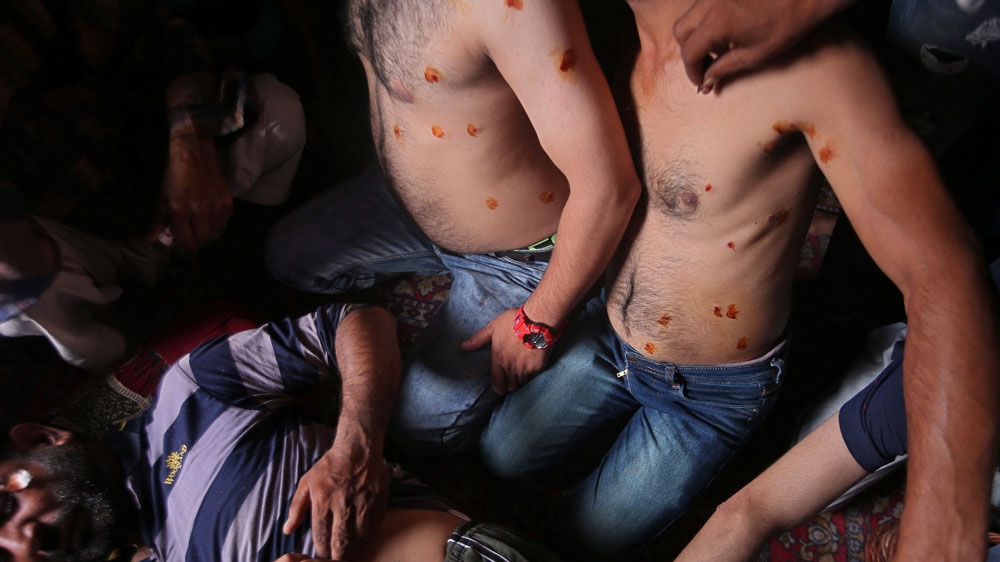
Thursday, August 22
Indian opposition parties protest against Kashmir detentions
Major opposition parties in India have joined forces to protest against the government’s clampdown in Indian-administered Kashmir , demanding the immediate release of political leaders and the restoration of communication services in the Himalayan region
Opposition figures addressed the New Delhi protest, which was organised by Dravida Munnetra Kazhagam, a regional party from the southern state of Tamil Nadu.
“The ruling Bharatiya Janata Party and its ideological wing, RSS, are celebrating the abrogation of Article 370, while the majority of people don’t even know what the Article is,” Ghulam Nabi Azad, of the Indian National Congress, told the hundreds of people in the crowd.
Read the full story here
‘Patriotism pop’ urges Hindus to claim Kashmir
The music videos began appearing on social media within hours of the announcement by India’s Hindu-led nationalist government that it was stripping statehood from the disputed region of Kashmir that had been in place for decades.
The songs delivered a message to India’s 250 million YouTube users about moving to the Muslim-majority region, buying land there and marrying Kashmiri women.
It is the latest example of a growing genre in India known as “patriotism pop” – songs flooding social media about nationalism and the country’s burgeoning right-wing ideology.
Read more here.
‘India talked of peace and calm, I saw the opposite’
“I arrived in Srinagar with my sister on August 1. Having grown up in Kashmir, I didn’t think too much when I saw the shuttered tourist information desk at the airport and the military presence.
Driving home, I noticed that the military presence was larger than normal in what is already one of the most militarised zones in the world. It was the peak of the tourist season, thousands of Amarnath Yatra pilgrims were visiting, and with Eid and the wedding season around the corner, the streets were busy.
The following morning, I woke up early. My phone was buzzing with messages from friends and family asking if we were OK.”
Read the full account here.
|
|
Imran Khan rules out dialogue with India
Pakistan’s Prime Minister Imran Khan has ruled out seeking dialogue with India over the Kashmir issue, saying “there is nothing more we can do”.
“There is no point in talking to them,” Khan said in an interview with The New York Times. “I have done all the talking. Unfortunately, now when I look back, all the overtures that I was making for peace and dialogue, I think they took it for appeasement.”
Read the full story here.
4,000 people have been detained in Kashmir since India revoked its autonomy. These people are searching for loved ones detained in raids. pic.twitter.com/6oElwyRkuU
— AJ+ (@ajplus) August 22, 2019
Wednesday, August 21
Pakistan lodges UN complaint against Indian actress
Pakistan has demanded the United Nations remove Indian actress Priyanka Chopra as a UN goodwill ambassador over her “support for war” amid heightened tensions between the two nuclear-armed neighbours.
In a letter to the UNICEF chief Henrietta Fore, Pakistan’s Minister of Human Rights Shireen Mazari accused the 37-year-old actress and former Miss World of publicly endorsing the position of Prime Minister Narendra Modi‘s Hindu nationalist government in Indian-administered Kashmir.
“Her jingoism and support for violations by the Modi government of international conventions and UN Security Council resolutions on Kashmir, as well as support for war, including a nuclear war, undermines the credibility of the UN position to which she been elevated,” Mazari said in the letter.
Read more here.
HR Minister Dr @ShireenMazari1 today wrote a letter to UNICEF chief to remove Priyanka Chopra as UN Goodwill Ambassador for Peace over her pro-war comments and support to BJP Govt policy of ethnic cleansing/racism/fascism/genocide@UNICEF @UNHumanRights @pid_gov @appcsocialmedia pic.twitter.com/owtnbjSfEX
— Ministry of Human Rights (@mohrpakistan) August 21, 2019
Jailed Kashmir separatists call for rally
Separatist leaders in Indian-administered Kashmir have urged people to defy a ban and join a mass march after Friday prayers this week.
Hundreds of political leaders and activists, many of them separatists seeking Kashmir’s secession from India, have been arrested and the appeal to the public came through posters that appeared overnight in the region’s main city of Srinagar.
“Every person, young and old, men and women, should march after Friday prayers,” the Joint Resistance Leadership, which represents all major separatist groups, said on one poster.
Modi raises Kashmir protests with UK’s Johnson
Indian Prime Minister Narendra Modi has spoken to his British counterpart, Boris Johnson, about violent demonstrations over Kashmir outside the Indian embassy in London, the foreign ministry said.
Thousands of people, many waving Pakistani and Kashmiri flags, protested outside the embassy last week, on India’s independence day, against Modi’s withdrawal of Kashmir’s special status.
In a telephone call with Johnson, Modi “referred to the violence and vandalism perpetrated by a large mob against the High Commission of India in London”, India’s foreign ministry said in a statement.
“Prime Minister Johnson regretted the incident and assured that all necessary steps would be taken to ensure safety and security of the High Commission, its personnel and visitors,” the ministry said.
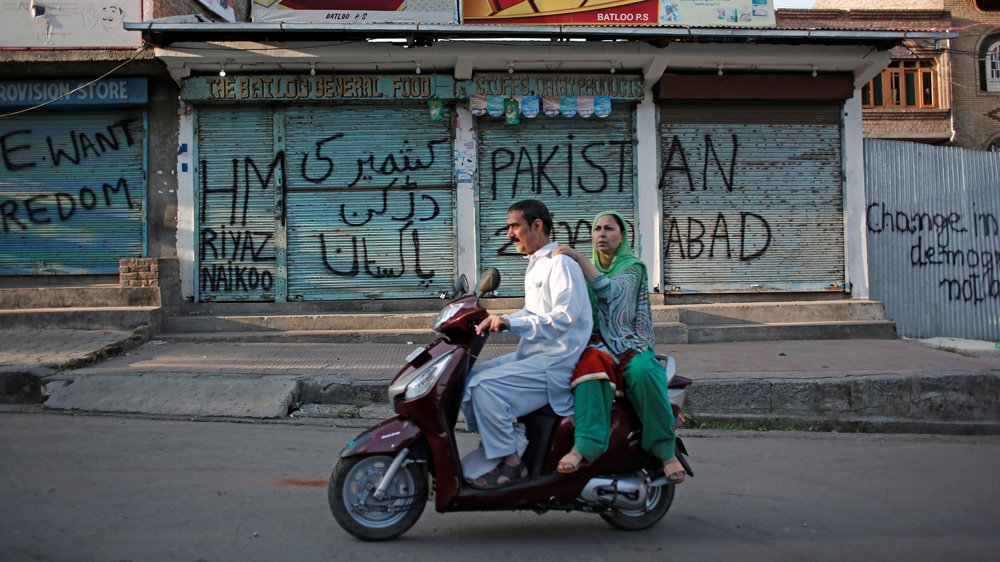
Trump: I will do best to mediate Kashmir standoff
US President Donald Trump has reasserted his offer to mediate what he called an “explosive” situation in Kashmir.
Trump said he would raise the matter over the weekend with Indian Prime Minister Narendra Modi at the G7 summit in France.
“Kashmir is a very complicated place. You have Hindus and you have the Muslims and I wouldn’t say they get along so great,” Trump told reporters at the White House.
“I will do the best I can to mediate,” he added.
Police say 2 killed in gun battle in Baramulla
Two people, including a police officer, were killed in a gun battle between armed rebels and security forces in Indian-administered Kashmir, police said on Wednesday.
The clash in the northern district of Baramulla was the first to be reported by the authorities since New Delhi revoked the autonomy of the part of Kashmir that it controls and imposed a curfew and communications lockdown earlier this month.
Read more here.
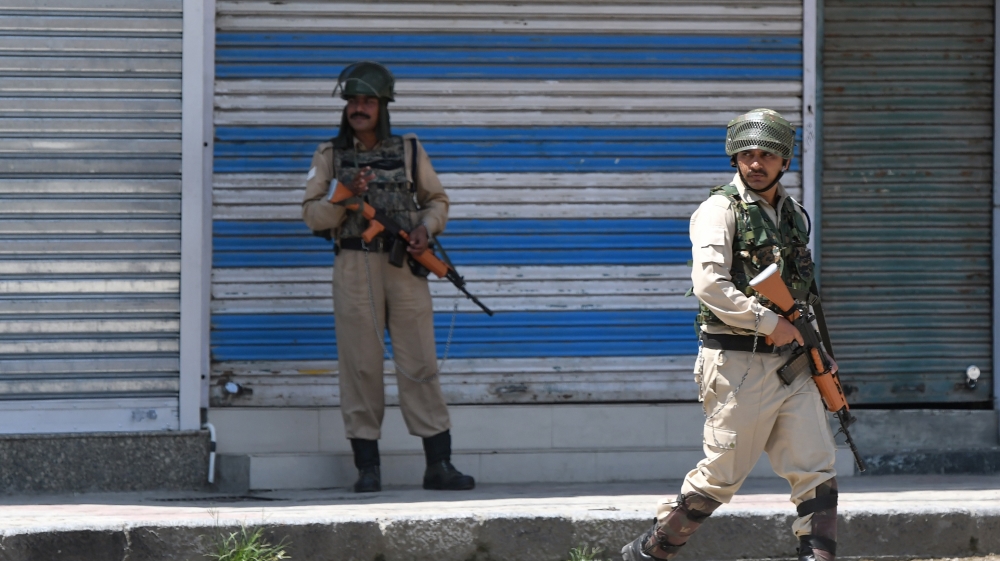
‘Women biggest victims of this inhumane siege’
After August 5, when India revoked Kashmir’s special status and followed the move with a military lockdown, Uzma Javed did not leave her house for days. Every few hours, she looked out of the window from her family’s two-storey house in Srinagar, the largest city in Indian-administered Kashmir.
A 20-year-old student who usually lives in Kerala, Javed had returned home to spend Eid with her relatives. But instead of celebrating, she found herself caged in while outside, armed Indian paramilitary forces manned largely empty streets.
Read the full story here.
Tuesday, August 20
Macron to discuss Kashmir with Modi
French President Emmanuel Macron will discuss tensions in the divided region of Kashmir with Indian Prime Minister Narendra Modi when the two meet in Paris this week, a French official said.
Meanwhile, British Prime Minister Boris Johnson also weighed in on Kashmir telling Modi in a phone call that the issue was one for India and Pakistan to resolve between themselves through dialogue.
Macron and Modi are set to sit down for a working dinner at the Chateau de Chantilly outside Paris on Thursday ahead of a G7 summit in France this weekend, to which Modi has been invited.
Pakistan to take Kashmir dispute with India to world court
Pakistan said it would take the Kashmir dispute with India to the International Court of Justice after New Delhi revoked special status for its portion of the region earlier this month.
“We have decided to take Kashmir case to the International Court of Justice,” Foreign Minister Shah Mehmood Qureshi told ARY News TV.
“The decision was taken after considering all legal aspects.”
Kashmir tensions: ‘War is not a solution’
As the tough political talk on Kashmir has a direct effect on the lives of millions of people on both sides of the Line of Control, Al Jazeera talks to three key figures on the Pakistani side and asks: Will Pakistan be able to neutralise the Indian move; can diplomacy defuse tensions; and will other powers like China get involved, and if so, what could this mean for Kashmiris?
Watch the full episode here.
|
|
Authorities make more arrests to deter protests
Security forces have detained 30 people overnight in Srinagar, local officials said, amid frequent demonstrations in the city despite a clampdown on phone and internet services, a ban on public gatherings and the detention of hundreds of political leaders and separatists.
“These arrests have been made in the areas where there has been intensifying stone pelting in the last few days,” a police officer said, speaking on condition of anonymity. A local government official confirmed the latest detentions, Reuters news agency reported.
Government sources have told AFP news agency at least 4,000 people have been arrested in Indian-administered Kashmir since August 5, with some of them moved out of the disputed region as jails have run out of capacity.
Besieged Srinagar neighbourhood in test of wills with forces
For more than a week, the young men of Soura, a densely populated enclave in Indian-administered Kashmir’s main city of Srinagar, have been taking turns to maintain an around-the-clock vigil at the entry points to their neighbourhood.
Soura, home to about 15,000 people, is becoming the epicentre of resistance to India’s plans to remove the partial autonomy that was enjoyed by the Muslim-majority Jammu and Kashmir state.
The enclave has effectively become a no-go zone for the Indian security forces.
Read the full story here.
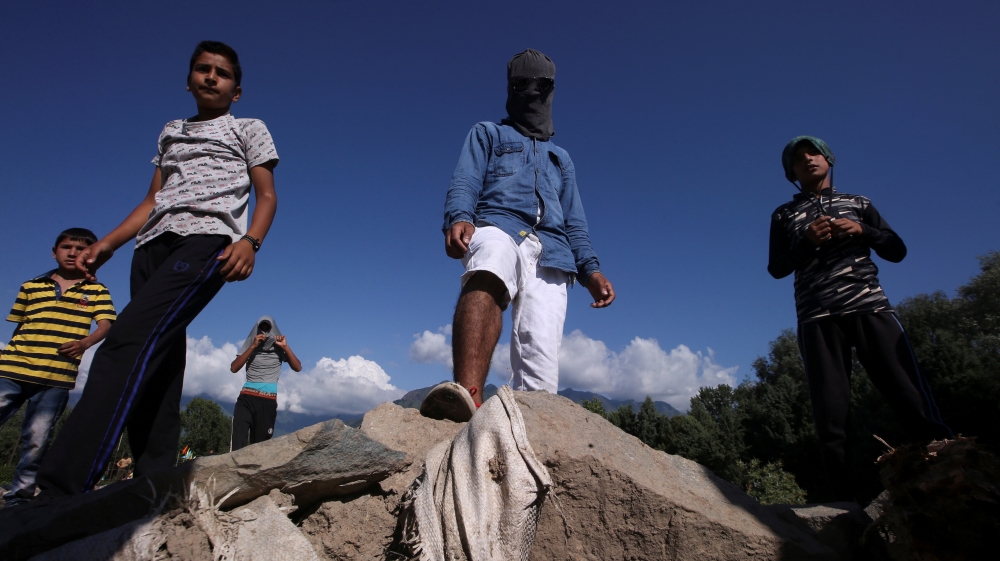
Monday, August 19
Trump talks Kashmir with India, Pakistan PMs
US President Donald Trump spoke with the prime ministers of India and Pakistan, urging them to reduce tensions over the disputed region of Kashmir.
“Spoke to my two good friends, Prime Minister [Narendra] Modi of India, and Prime Minister [Imran] Khan of Pakistan, regarding Trade, Strategic Partnerships and, most importantly, for India and Pakistan to work towards reducing tensions in Kashmir,” Trump tweeted.
“A tough situation, but good conversations!” the president wrote.
As schools reopen in Kashmir, students mostly stay home
Main government offices and a few schools in Indian-administered Kashmir have reopened after two weeks of a clampdown in the disputed region.
Nearly 200 primary schools were ordered by the authorities to reopen in certain areas. However, attendance in schools remained scant, as many parents decided against sending their children amid heightened tensions in the state.
Read the full story here.
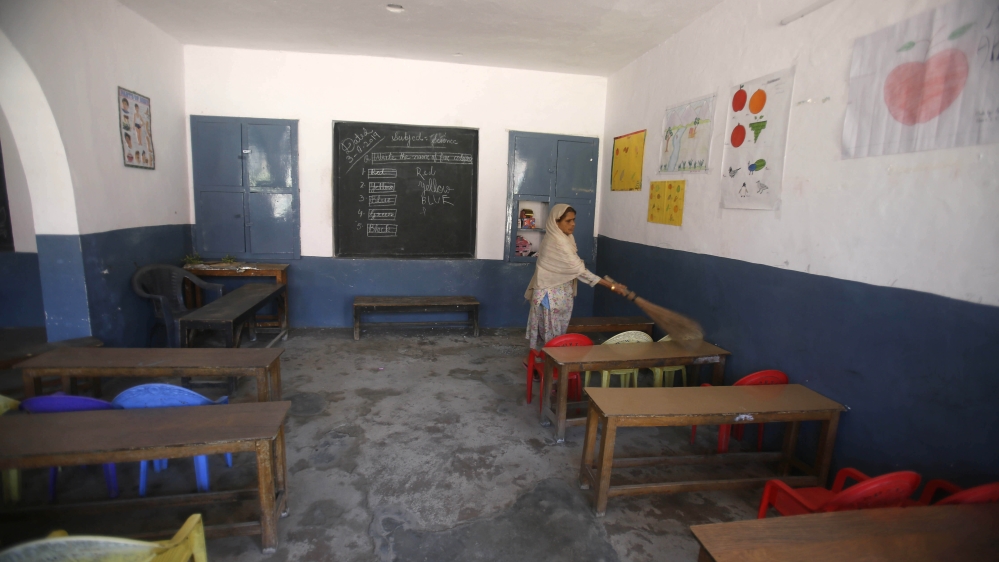
Pakistan army chief’s tenure to be extended by three years
Pakistani Prime Minister Imran Khan extended his military chief’s term by another three years, an official statement released by his office said. The decision comes amid the ongoing crisis in Kashmir, which has seen tensions escalate between India and Pakistan.
“General Qamar Javed Bajwa is appointed as Chief of Army staff for another term of three years from date of completion of current tenure,” read the statement.
“The decision has been taken in view of the regional security environment.”
He was first appointed as army chief in November 2016 by the then Prime Minister Nawaz Sharif for a three-year term.
Schools deserted as parents fear more unrest
Some 190 primary schools reopened in Indian-administered Kashmir’s main city of Srinagar, but most classrooms were empty as parents kept their children home.
Parents said their children would stay home until cellular phone networks were restored and they could be in contact with them.
|
|
Pakistan says Indian fire kills 2 civilians in Kashmir
Pakistan said Indian troops have fired across the Line of Control (LoC) in the disputed Kashmir region, killing two civilians and wounding another.
Pakistan’s foreign ministry said in a statement that civilian casualties occurred on Sunday because of “unprovoked ceasefire violations” by India in the border villages of Hot Spring and Chirikot.
The ministry said Pakistan summoned an Indian diplomat and lodged a protest over continued ceasefire violations, which “are a threat to regional peace”.
Sunday, August 18
India reimposes some curbs on movement, phones
Indian authorities have reimposed restrictions on movement in major parts of Srinagar after violent overnight clashes between residents and police in which dozens were injured, officials and witnesses said.
Two senior government officials told Reuters news agency that at least two dozen people were admitted to hospitals with pellet injuries.
They also reversed a decision to allow internet and mobile phone use in parts of the Jammu region, according to one official, amid concerns about the spread of rumours online.
4,000 arrested since autonomy stripped: Gov’t sources
A magistrate speaking to AFP news agency on condition of anonymity said at least 4,000 people were arrested in Indian-administered Kashmir and held under the Public Safety Act (PSA), a controversial law that allows authorities to imprison someone for up to two years without charge or trial.
“Most of them were flown out of Kashmir because prisons here have run out of capacity,” the magistrate said, adding that he had used a satellite phone allocated to him to collate the figures from colleagues across the Himalayan territory amid a communications blackout imposed by authorities.
|
|
Fascists control India’s nuclear arsenal: Pakistan
Pakistan’s Prime Minister Imran Khan has urged the international community to take steps to secure India’s nuclear arsenal after New Delhi hinted a shift in its “no first use” policy.
“The World must also seriously consider the safety & security of India’s nuclear arsenal in the control of the fascist, racist Hindu Supremacist Modi Govt. This is an issue that impacts not just the region but the world,” he said in a tweet.
India’s Defence Minister Rajnath Singh on Friday said while India had strictly adhered to the nuclear weapons doctrine of “no first use” policy, what would happen in the future will depend on circumstances.
Already 4m Indian Muslims face detention camps & cancellation of citizenship. World must take note as this genie is out of the bottle & the doctrine of hate & genocide, with RSS goons on the rampage, will spread unless the international community acts now to stop it.
— Imran Khan (@ImranKhanPTI) August 18, 2019
Saturday, August 17
Kashmir’s key political leaders arrested since August 5
Indian authorities have carried out a major crackdown against political leaders in Indian-administered Kashmir and arrested high-profile figures that include three former chief ministers of the Muslim-majority state.
The arrests coincided with the abrogation of the decades-old Article 370 of the Indian constitution that protected the demography of Jammu and Kashmir state and provided it with limited autonomy.
Read the full story here.
Heavy fire reported near LoC between India and Pakistan
Gunfire has been exchanged across the heavily-militarised Line of Control (LoC) between Indian-administered and Pakistan-administered Kashmir.
The incident took place in Nowshera town of the Rajouri district in the state of Jammu and Kashmir.
Indian defence spokesman Colonel Aman Anand said that one soldier was killed allegedly by Pakistan forces. Pakistan has yet to comment on this latest development.
Pakistan announces Kashmir desk at foreign ministry, embassies
Pakistani Foreign Minister Shah Mehmood Qureshi has said the country was establishing a Kashmir desk at the ministry and at its embassies in foreign capitals.
He said this was decided to “lobby for Kashmiris and their right to self-determination” and “in order to carry out effective communication on the matter”.
Khan welcomes first UN session on Kashmir in decades
Pakistani Prime Minister Imran Khan welcomed the UN Security Council meeting that was held in New York on Friday.
He hailed the session as a “reaffirmation” of 11 previous UNSC resolutions on Kashmir, that gaurantees Kashmiris the right to self-determination.
I welcome the UNSC meeting to discuss the serious situation in Occupied Jammu & Kashmir. It is for the first time in over 50 yrs that the world’s highest diplomatic forum has taken up this issue. There are 11 UNSC resolutions reiterating the Kashmiris right to self determination.
— Imran Khan (@ImranKhanPTI) August 17, 2019
India to ease restrictions in parts of Kashmir
Local police in the Jammu and Kashmir state said on Saturday that 17 out of 100 telephone exchanges were restored in the Kashmir Valley.
According to Al Jazeera correspondent Anchal Vohra, most of the landline telephone services in Jammu had been restored. Restrictions were tougher in Kashmir, where India’s clampdown continues to be far more constraining.
Read full story here.
Friday, August 16
How a red dot symbolised Kashmir resistance
The famous red dot that marks the story of Indian-administered Kashmir on social media came much before India scrapped the Muslim-majority region of its special status.
The decision to revoke Article 370 of India’s constitution on August 5 was preceded by a heavy military build-up in the Himalayan valley, followed by a crippling lockdown now in its 12th day, and arrests of hundreds of political leaders and activists.
Read the full story here.
Kashmir on lockdown, but Modi touts its investment potential
A few days after Jammu and Kashmir’s special status was eradicated, Indian Prime Minister Narendra Modi claimed that the now-abolished Article 370 of India’s constitution – the provision that had guaranteed special rights to the Muslim-majority region – had also hampered its economic development.
“There must be investment and job opportunities in Jammu and Kashmir,” Modi told CNN-News 18. “No one goes there to invest.”
Read the full story here.
Trump urges India, Pakistan to reduce tensions
US President Donald Trump told Pakistan’s Prime Minister Imran Khan that it was important India and Pakistan reduce tensions in Jammu and Kashmir through “bilateral dialogue,” the White House said in a statement.
White House spokesperson Hogan Gidley said the two leaders in a telephone call also discussed building the growing relationship between the United States and Pakistan, citing momentum created during their recent meeting at the White House.
India UN envoy: Kashmir decision internal matter
India’s ambassador to the United Nations criticised international interference over Kashmir, after the Security Council held its first formal meeting on the disputed region in decades.
“We don’t need international busybodies to try to tell us how to run our lives,” Syed Akbaruddin told reporters in New York, adding that India’s decision was an internal matter.
“If there are issues, they will be discussed, they will be addressed by our courts,” he said.
Read the full story here.
Pakistan UN envoy: Voice of Kashmiri people has been heard
Pakistan’s ambassador to the UN said people in Indian-administered Kashmir “are not alone”, adding that they “may be locked up … but their voices were heard today”.
Maleeha Lodhi was speaking to reporters after the Security Council met behind closed doors to discuss the situation in Kashmir for the first time in decades. She said that the meeting was called 72 hours after Pakistan’s Foreign Minister wrote a letter requesting it in the wake of India’s move.
“We are grateful to China in also joining us and calling this meeting,” she said.
“The voice of the Kashmiri people, the voice of the people of occupied Kashmir has been heard today in the highest diplomatic forum of the world.
“They are not alone … their plight, their hardship, their pain, their suffering, their occupation and the consequences of that occupation has been heard in the UNSC.”
Lodhi said that the very fact this meeting had taken place is “testimony to the fact that this is an internationally recognised dispute”.
Chinese UN envoy: Kashmir situation ‘very tense, very dangerous’
The Chinese ambassador to the UN said the Security Council feared that the situation in Kashmir might worsen.
Speaking to reporters after the council wrapped up the closed-door meeting in New York, Zhang Jun said the situation in Kashmir is “already very tense and very dangerous”.
He added that the members of the council generally feel India and Pakistan should both refrain from unilateral action over Kashmir.
UN Security Council meets to discuss Kashmir
The UN Security Council met behind closed doors to discuss the situation in Kashmir for the first time in decades at the request of China and Pakistan.
The UN’s most powerful body was being briefed morning by Assistant Secretary-General Oscar Fernandez-Taranco and General Carlos Humberto Loitey, the UN military adviser.
UN officials said the council session may be its first on Kashmir since the late 1990s, or possibly since the 1971 India-Pakistan war.
Russia’s deputy UN ambassador, Dmitry Polyansky, told reporters as he headed into the meeting that Moscow was concerned about the latest developments, but he said it was “a bilateral issue”.
Amnesty International Secretary-General Kumi Naidoo said in a statement that council members “need to remember that their mandate is to protect international peace and security – and they should seek to resolve the situation in a way that puts the human rights of the people in this troubled region at its centre.”
Pakistan: Khan and Trump discuss Kashmir
Prime Minister Khan, has held a telephone conversation with Trump in which the two leaders discussed the events in Kashmir.
Foreign Minister Shah Mahmood Qureshi said Khan shared his concern with Trump that the situation in Kashmir posed a danger to the region.
He said the conversation was part of the prime minister’s outreach to world leaders about the developments in Kashmir.
There was no information about Trump’s comments.
Candlelight vigil voices solidarity with Kashmir
Scores of Pakistanis living in Turkey gathered outside the Pakistan Embassy in Ankara on Thursday evening for a candlelight vigil expressing their solidarity with the people of Indian-administered Jammu and Kashmir.
With candles and posters in their hands, they were joined by many Turks, who said they had come to express support for the Kashmiri population.
India says restoring phone lines in Kashmir
India will begin restoring phone lines in Kashmir on Friday evening, a top official said, after a 12-day blackout following the stripping of the region’s autonomy.
Jammu and Kashmir Chief Secretary BVR Subrahmanyam did not make clear, however, whether mobile phones and internet connections would also be reinstated in the Muslim-majority northern region.
“You will see a gradual restoration (of telephone lines) from tonight and tomorrow onwards. You will find a lot of Srinagar functioning tomorrow morning,” Subrahmanyam said, referring to the main city in the restive Kashmir Valley.
“Exchange by exchange they will be switching it on. Over the weekend you will have most of these lines functioning most probably,” he told reporters.
He said the easing would “(keep) in mind the constant threat posed by terrorist organisations in using mobile connectivity to organised terrorist actions.”
‘Expectations high’ ahead of UNSC meeting
The first special UN Security Council session on Kashmir will take place today after 54 years.
In Muzaffarabad, capital of Pakistan-administered Kashmir, Al Jazeera’s Osama Bin Javaid, said “expectations are really high” ahead of the session.
Protesters in Pakistan administered #Kashmir demand UN listen to their plight as many are worried about family members on the other side.
Kashmiris say they can only appeal to the world's conscience as they believe there is no other solution but diplomacy pic.twitter.com/43C6w4Jgct— Osama Bin Javaid (@osamabinjavaid) August 16, 2019
“The people are calling on the UN and the UNSC members to listen to the plight of the Kashmiris,” said Javaid.
The UNSC move is being hailed as a diplomatic victory by Pakistan, but the government was wary of any “concrete steps to be taken to stop India or roll back whats its done in Kashmir”.
Red dot symbolising Kashmiri resistance
While the Kashmir region remains locked down, Kashmiri diaspora is using social media to organise protests and mobilise opinion.
Amid the crisis, Stand With Kashmir, a grassroots advocacy group in the United States, posted a red dot on its Instagram account they had set up only months ago.
“We decided to use it [the red dot] as a campaign [to] try to at least do some kind of an initial social media organising to make people aware.”
Read more here.
Clampdown to be eased in ‘next few days’
India will lift restrictions on people’s movements and communication links in Kashmir in the next few days, the federal government told the Supreme Court on Friday.
The court was hearing a petition by a newspaper editor seeking restoration of telephone and internet services snapped this month, just before the government withdrew Kashmir’s special status, to prevent protests.
The restrictions would be lifted in the “next few days”, the government lawyer, Tushar Mehta, said. “The ground situation is being reviewed daily and the Supreme Court must trust the security agencies.”
Indian troops’ firing ‘kills another Pakistani soldier’
Pakistan’s army said Indian troops fired across the Line of Control in the disputed Kashmir region, killing another soldier and bringing the death toll to six in less than 24 hours.
Army spokesman Major General Asif Ghafoor in a tweet Friday said “another brave son of soil lost his life in the line of duty” in Buttal town.
On Thursday, Pakistan’s army said at least three of its soldiers and five Indian soldiers were killed after a cross-border exchange of fire, prompting a denial by New Delhi that there were fatalities among its forces.
Another brave son of soil laid his life in the line of duty. Sepoy Muhammad Sheeraz embraced shahadat due to Indian firing in Buttal Sector along LOC. pic.twitter.com/BAozVnsuGY
— DG ISPR (@OfficialDGISPR) August 16, 2019
Thursday, August 15
Indian troops detain Kashmiri journalist
Indian troops detained a Kashmiri reporter working for a local newspaper in an overnight raid on his house in Southern Pulwama district, his family said.
Irfan Ahmad Malik, 28, works for Greater Kashmir, the largest daily newspaper in the Kashmir valley. It was not immediately clear why he had been detained.
More than 500 local leaders and activists have been detained in the past 12 days of the crackdown.
Thousands demonstrate in London against India move
Several thousand people protested outside the Indian embassy in London against the country’s move to strip the Indian-controlled part of Kashmir of its autonomy.
Demonstration against India in front of Indian High Commission in London.#15AugustBlackDay pic.twitter.com/sQegWoyj9l
— Govt of Pakistan (@pid_gov) August 15, 2019
The protesters in the United Kingdom’s capital held up signs reading “Kashmir is bleeding” and waved Kashmiri and Pakistani flags. Police separated them from a smaller pro-India counter-demonstration.
Indian army: ‘No casualties’
An Indian army spokesperson has denied the Pakistani army’s statement that five Indian soldiers were killed in a cross-border exchange of fire in the disputed region of Kashmir.
“No casualties. This assertion is wrong,” the spokesperson was quoted as saying by Reuters news agency.
In a statement quoted by news agencies, the Indian army said that at about 7am, Pakistan violated a ceasefire between the two nations in the heavily militarised LoC.
Read the full story.
Fire across LoC ‘kills 3 Pakistani, 5 Indian troops’
At least three Pakistani soldiers and five Indian troops have been killed after an exchange of fire across the Line of Control in the disputed region of Kashmir, Pakistan’s army has said.
Major General Asif Ghafoor, the chief spokesman of the Pakistan Armed Forces, said in a Twitter post on Thursday that Indian forces had increased firing along the contested border.
Read the full story.
‘Black Day’ over Kashmir
Pakistan is observing a ‘Black Day’ to coincide with India’s independence day celebrations.
Newspaper issues carried black borders and politicians, including Prime Minister Imran Khan, replaced their social media pictures with black squares. Flags on government buildings flew at half-mast.
Nearly a 1,000 supporters of Hizbul Mujahideen rebel group marched through Muzaffarabad, capital of Pakistan-administered Kashmir, holding black flags and shouting anti-India slogans.
UN ‘likely’ to discuss Kashmir issue on Friday
The UN Security Council (UNSC) is expected to discuss the Kashmir issue on Friday, Radio Pakistan reported, citing diplomatic sources.
Pakistan’s Geo News also reported the news quoting UNSC president Joanna Wronecka as saying: “The UNSC will discuss the Jammu and Kashmir situation behind closed doors most likely on August 16.”
Modi must lift Kashmir communications blackout: Amnesty
Amnesty International has asked Indian Prime Minister Narendra Modi to lift the communications blackout and engage with the people of Jammu and Kashmir.
“It is a paradox that as India celebrates its 73rd independence day today, the people of Jammu and Kashmir continue to be subjected to a lockdown for the past 10 days,” the rights group said in a statement.
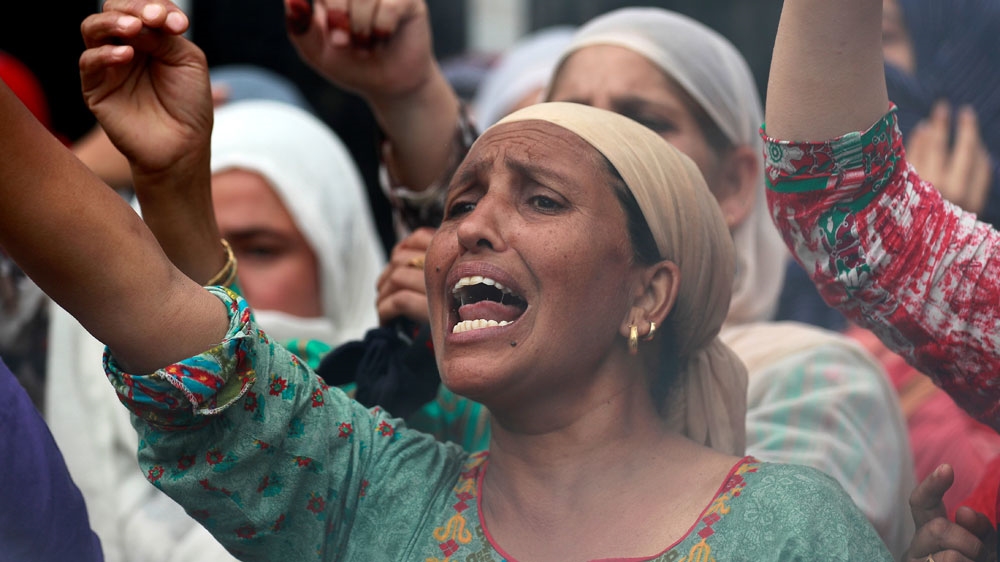
Modi defends move to revoke Kashmir’s special status
Modi has defended his decision to revoke Kashmir’s special status, saying the move is to ensure the idea of “one nation, one constitution”, which he said will foster growth in the troubled region, at the 73rd-anniversary celebration of Indian independence in New Delhi.
“We don’t believe in delaying solving problems, we also don’t let problems fester,” Modi said, saying two-thirds of both houses of Indian parliament approved the plan.
Read the full story.
We do not believe in creating problems or prolonging them.
In less than 70 days of the new Government, Article 370 has become history, and in both Houses of Parliament, 2/3rd of the members supported this step.
We want to serve Jammu, Kashmir, Ladakh: PM @narendramodi
— PMO India (@PMOIndia) August 15, 2019
Wednesday, August 14
How are Kashmiris coping under lockdown?
Millions in Indian-administered Kashmir are living under curfew after the government revoked the state’s semi-autonomy.
Thousands of troops were sent to the Muslim-majority region, while telephone lines and internet connections are blocked.
Al Jazeera’s The Stream looks at what lies in store for the people of Kashmir amid the ongoing lockdown.
Watch the special episode here.
Indian activists release report after Kashmir visit
A group of Indian activists, economists, writers and members of leftist organisations presented their observations of the situation in Kashmir in the capital New Delhi on Wednesday after returning from a five-day trip to the disputed region.
Kavita Krishnan, a left-wing activist, said the situation is “absolutely not normal,” contrary to reports by several Indian news broadcasters.
Read the full story.
Pakistan protests killing of villager in Kashmir
Pakistan’s foreign ministry said it has summoned an Indian diplomat to protest the killing of a civilian by Indian fire in disputed Kashmir.
The ministry said in a statement that a 38-year-old villager was killed on Tuesday by an “unprovoked cease-fire violation by Indian troops on the Pakistani side of Kashmir.”
Restrictions in Jammu region lifted: Report
Restrictions in the Jammu region of Indian-administered Kashmir have been “completely removed”, Indian news agency PTI said, quoting a senior police official.
“Restrictions imposed in Jammu have been completely removed and schools and other establishments there are functioning. Restrictions will continue in some places of Kashmir for some time,” Additional Director General Munir Khan said, according to PTI.
India’s Kashmir move ‘strategic blunder by Modi’
India’s move of revoking Article 370 and imposing a lockdown in Kashmir is a strategic blunder by Indian PM Narendra Modi, his Pakistani counterpart Imran Khan has said while addressing legislators in Pakistan-administered Kashmir.
Khan visited Muzaffarabad on Pakistan’s independence day as he reaffirmed his support to the Kashmiri people in their struggle for self-determination amid heightened tensions with neighbouring India.
Read more here.
|
|
Kashmir leader Shah Faesal ‘arrested at New Delhi airport’
Shah Faesal, a former bureaucrat who launched a political party in Indian-administered Kashmir earlier this year, has been arrested at New Delhi airport and sent back to Srinagar, according to Indian media reports.
On Tuesday, Faesal had tweeted that Kashmir “will need a long, sustained, non-violent” movement for the restoration of the Muslim-majority region’s special status under the Indian constitution.
https://twitter.com/shahfaesal/status/1161161208596066304?ref_src=twsrc^tfw
Imran Khan visits Pakistan-administered Kashmir
Pakistan’s Prime Minister Imran Khan has visited Pakistan-administered Kashmir as he reiterated his support to the Kashmiri people living in the Indian-administered part of the divided region.
Khan’s visit to Muzzaffarad, the capital of Pakistan-administered Kashmir, to mark the country’s independence day came more than a week after New Delhi’s decision to downgrade Kashmir’s status.
Read more here.
Pakistan observes ‘Kashmir Solidarity Day’
Pakistan is observing its 72nd independence day in solidarity with the people of Kashmir this year.
While addressing a flag-hoisting ceremony in the capital, Islamabad, President Arif Alvi said that Pakistan has always stood by Kashmiris and would continue to do so, local media Dawn reported.
Government has decided to observe Independence Day this year as #KashmirSolidarityDay to show Pakistan’s support and unity with the people of Indian Occupied Jammu & Kashmir for their ongoing freedom struggle.#IndependenceDayWithKashmir #StandWithKashmir pic.twitter.com/aztlExiJ4t
— Govt of Pakistan (@pid_gov) August 13, 2019
Kashmir curfew to be eased after Thursday: Governor
Restrictions on freedom of movement in Indian-administered Kashmir will be eased after India’s independence day on Thursday, the state governor said; phone lines and the internet will remain cut off.
Satya Pal Malik told the Times of India that communications would remain blocked.
“In a week or 10 days, everything will be all right and we will gradually open lines of communication,” Malik told the newspaper in an interview.
Dear Maalik ji,
I saw your feeble reply to my tweet.
I accept your invitation to visit Jammu & Kashmir and meet the people, with no conditions attached.
When can I come?
— Rahul Gandhi (@RahulGandhi) August 14, 2019
Tuesday, August 13
Amnesty condemns India court’s support for crackdown
Amnesty International India condemned a decision by India’s Supreme Court to allow New Delhi to continue a security crackdown and communications blackout in Indian-administered Kashmir.
Amnesty also urged New Delhi to ease restrictions and expressed “deep concern” over people’s right to freedom of movement, expression and opinion, as well as the detention of political leaders and activists, and “the impairment of the press to freely report on the current developments and act as a bridge for the voices from the region”.
Pakistan calls on UNSC to address India’s Kashmir move
The Pakistani government asked the UN Security Council to meet over India’s decision revoking Indian-administered Kashmir’s special status.
“Pakistan will not provoke a conflict. But India should not mistake our restraint for weakness,” Pakistan’s Foreign Minister Shah Mahmood Qureshi wrote in a letter to the council seen by Reuters news agency.
|
|
It was not immediately clear how the 15-member council would respond to the request. Polish Foreign Minister Jacek Czaputowicz told reporters at the UN that the council “will discuss that issue and take a proper decision”.
Poland holds the presidency of the council for August.
Kashmir: Srinagar a maze of razor wires and steel barriers
The main city in Indian-administered Kashmir has turned into a vast maze of razor wire coils and steel barricades as drones and helicopters hover overhead.
Although the four million residents of the Kashmir Valley – where an armed conflict has simmered for decades – are used to blockades, they say the current one is something they have never seen before.
“The entire Srinagar city has been knitted in razor wire to seek our silence and obedience,” resident Zameer Ahmed told The Associated Press news agency.
Read more here.
India Supreme Court says Kashmir crackdown to continue
India‘s Supreme Court, in reviewing a petition for the immediate withdrawal of severe government restrictions in Kashmir, said the security crackdown and communications blackout should continue because the government needed more time to tackle the “sensitive” situation.
Attorney General KK Venugopal said: “We are reviewing the situation and lifting restrictions step by step,” in the Supreme Court, according to legal reporting website Bar&Bench.
Kashmir security lockdown enters 9th day
An unprecedented security lockdown has kept people in Indian-administered Kashmir indoors for a ninth day, with residents running short of essentials under a near-constant curfew and communications blackout.
The lockdown is expected to last at least through Thursday, India’s independence day.
Priyanka Gandhi Vadra, Congress on #Article370: The manner in which it has been done is completely unconstitutional & it's against all the principles of democracy, there are rules to be followed when such things are done, which were not followed. pic.twitter.com/av4RAsATNi
— ANI (@ANI) August 13, 2019
Rights activists write open letter to Modi
An open letter signed by 69 human rights activists and organisations, lawyers, journalists and academics, addressed to India’s Prime Minister Narendra Modi raised concerns over the human rights violations in Indian-administered Kashmir.
The letter called on Modi to revoke the curfew, reinstate communication, release all those arbitrarily detained over the last few days, and restore the status of Jammu and Kashmir under Article 370 of India’s constitution, which granted the Muslim-majority state considerable autonomy.
Read more here.
Kashmir protests overshadow Eid festivities
Hundreds of protesters defied a security lockdown in Indian-administered Kashmir on the first day of the Eid al-Adha holiday, as they marched on the streets of capital, Srinagar.
The protests lasted for a few hours after Eid prayers, before demonstrators dispersed peacefully.
“For Muslims, there are two days which are festive and sacred, and that’s Eid … but this is not our Eid. We are just mourning in Kashmir,” a resident told Al Jazeera.
|
|
Trump’s Kashmir mediation offer ‘not on table anymore’: Report
US President Donald Trump’s offer of mediation on the Kashmir issue between India and Pakistan is “not on the table anymore,” Indian media reports quoting India’s ambassador to the United States said.
“President Trump has made it very clear that his offer to mediate on Jammu and Kashmir is dependent on both India and Pakistan accepting it. Since India has not accepted the offer of mediation, he has made it clear that this is not on the table anymore,” Harsh Vardhan Shringla told a US-based news channel.
India calls the part of Kashmir it administers its “internal affair” and rejects any mediation, while Pakistan, which also claims the Himalayan region in full, wants world powers to resolve the issue.
Monday, August 12
Priyanka Chopra accused of ‘encouraging nuclear war’
Indian actress Priyanka Chopra has been branded a hypocrite over a tweet she posted in February amid escalating tensions between neighbours India and Pakistan.
The incident, which was widely shared online, took place during a cosmetics event on Saturday in the US city of Los Angeles when audience member Ayesha Malik accused Chopra of “encouraging nuclear war against Pakistan”.
"You are a UNICEF ambassador for peace, and you're encouraging nuclear war against Pakistan."
Indian actress Priyanka Chopra was confronted by a Pakistani-American woman, who called her a "hypocrite" over her pro-army tweet. pic.twitter.com/uJwqVJALes
— Al Jazeera English (@AJEnglish) August 13, 2019
Read more here.
Kashmiris fear escalating tension
People living in the disputed region of Kashmire have said they are afraid of escalating tension.
The disputed region is one of the world’s most dangerous flashpoints between nuclear-armed rivals, Pakistan and India.
Al Jazeera’s Osama Bin Javaid reports from the line of control in Pakistan-administered Kashmir.
|
|
HRW: Kashmir lockdown not a sustainable solution
US-based group Human Rights Watch (HRW) has expressed concern over the continued lockdown and communications blackout in Indian-administered Kashmir.
“There has to be a rights respecting-approach to handle the situation in Kashmir, where people are able to speak to their loved ones, have access to communication, essential supplies and hospitals, but we are seeing none of that,” Meenakshi Ganguly, HRW’s South Asia director, told Al Jazeera from Mumbai.
“This is not a sustainable solution. If the Indian government has decided to impose restrictions … they should ensure the Kashmiris are able to live their lives normally,” she added.
Activists in India mark Eid in solidarity with Kashmir
Almost 300 Kashmiris and activists gathered in India’s capital, New Delhi, to mark the Eid al-Adha celebration as Indian-administered Kashmir remains under lockdown for a week.
“I am here to express my solidarity with the people of Kashmir who have not been able to go home and are not able to talk to their parents because there is a total clampdown on communication,” said activist Shabnam Hashmi. “We are not celebrating Eid today.”
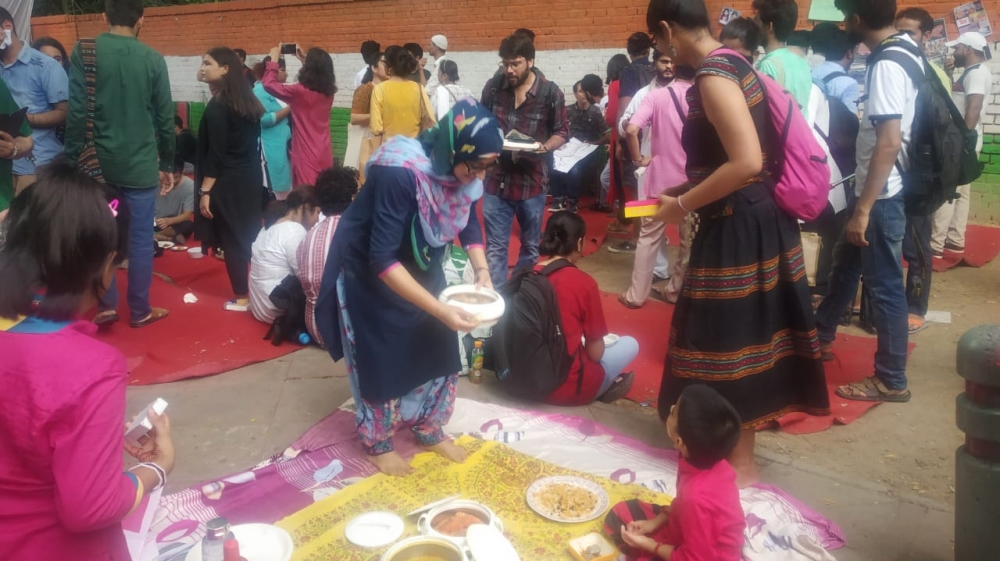
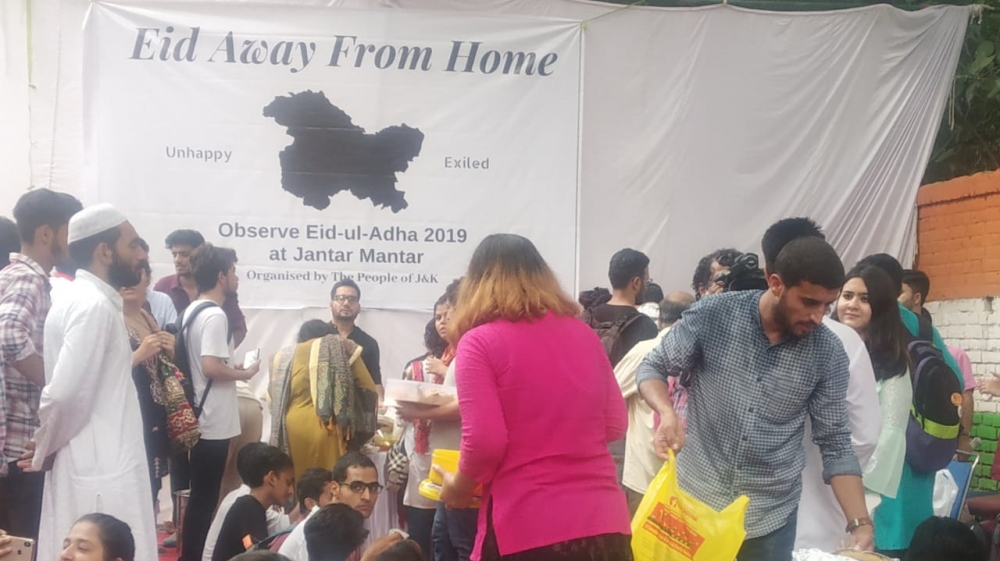
Pakistanis dedicate Eid prayers to Kashmir
The Pakistani government has called for the Eid al-Adha celebration to be observed in a “simple manner” this year, to express solidarity with Kashmiris living on the Indian side of the divided region.
Pakistan’s Minister of Foreign Affairs Shah Mahmood Qureshi travelled to Muzaffarabad, the capital of Pakistan-administered Kashmir, to offer Eid prayers at a mosque there.
In the southern city of Karachi, prayers were dedicated to Kashmiris in India. “We are together with our Kashmiri brothers,” said resident Mohammad Adnan.
“We share their pain and grief. Today, special prayers were offered for them inside the mosque.”
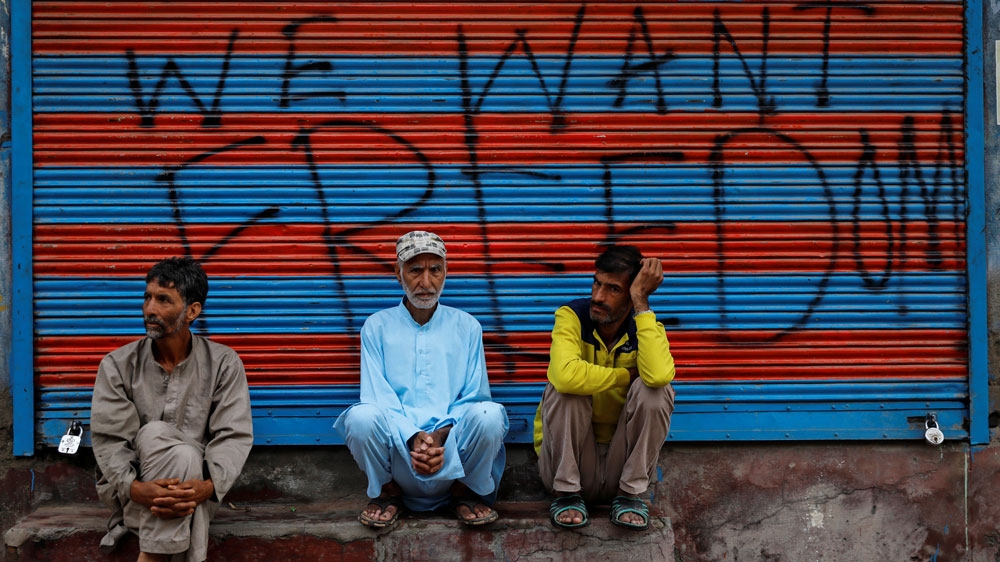
Amid ‘Eid siege’, Kashmiris try to reach loved ones
On the lawn of the district commissioner’s office in Srinagar, the main city of Indian-administered Kashmir, residents circle a table, hoping their turn will come soon.
With phone and internet usage cut off during a week-long lockdown imposed by the Indian government, authorities are allowing locals to use a mobile phone to briefly speak to their loved ones outside the Muslim-majority state.
Read more here.
|
|
India imposes tighter curbs to prevent Eid protests
Indian troops imposed tight restrictions on mosques across Kashmir for the Eid al-Adha celebration, fearing anti-government protests over the stripping of the Muslim-majority region’s autonomy, according to residents.
The Himalayan region’s biggest mosque, the Jama Masjid, was ordered to be closed and people were only allowed to pray in smaller local mosques so that no big crowds could gather, witnesses said.
All phone lines and the internet remained cut off for an eighth day on Monday.
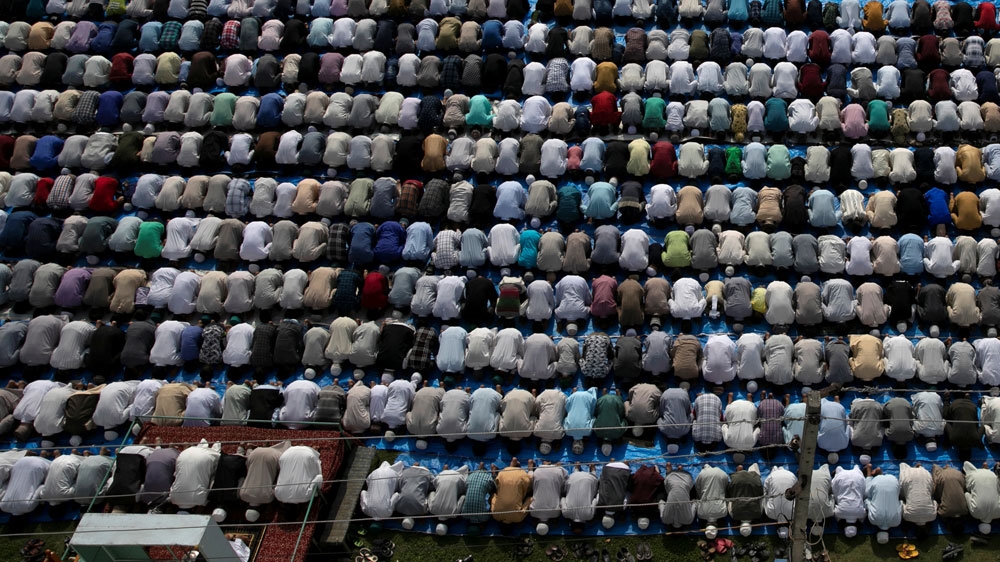
India wants Davis Cup tie moved from Pakistan
India has asked the International Tennis Federation to move their upcoming Davis Cup tie from Pakistan to a neutral venue due to escalating political tensions between the two nations.
The Indian team is scheduled to be in Pakistan’s capital, Islamabad, for the Asia/Oceania zone Group I tie to be held on September 14 and 15.
“We have asked ITF for a neutral venue because the situation is a bit unpredictable,” All India Tennis Association (AITA) president Praveen Mahajan told AFP on Sunday.
“I believe it is a reasonable request because of the current state of affairs.”
Wife of Kashmir leader appeals for UN intervention
Mushaal Hussein Mullick, the wife of Yasin Malik, a leading Kashmiri rebel leader held by India, has appealed to the world to “wake up” and intervene as the situation in the disputed territory remains tense.
Mullick told British broadcaster Sky News that “time is running short”, and that her husband’s “only hope is that the world will come forward”.
Yasin Malik used to head pro-independence group the Jammu Kashmir Liberation Front (JKLF), which was banned in March as part of India’s crackdown on separatist groups.
Malik was arrested a month later and is being held at Tihar prison in New Delhi. “He is so weak and doctors … they’ve all said that he’s going to die like this,” his wife said.
Sunday, August 11
Pakistan’s foreign minister attacks India over Kashmir move
Pakistan’s foreign minister has strongly criticised the Indian government for its revocation of Kashmir’s autonomous status.
In an exclusive interview with Al Jazeera in Muzaffarabad, Qureshi said: “Pakistan is watching the situation carefully, and so is the world.”
“We are concerned about the genocide that we feel can take place, or perhaps is taking place right now, because we have no idea what’s going on in the Indian-occupied Kashmir right now,” he argued.
“When they lifted the curfew for a few hours we saw thousands of people protesting in the streets, so it’s an evolving situation.”
Watch the interview at the video below.
|
|
India’s Kashmir move ‘inspired by Nazi ideology’: Khan
Pakistan’s Prime Minister Imran Khan has said India’s decision to scrap the special status of Kashmir was inspired by the “Nazi ideology”.
“The curfew, crackdown and impending genocide of Kashmiris in IOK [India-Occupied Kashmir as Islamabad refers to Indian-administered Kashmir] is unfolding exactly [according] to RSS ideology inspired by Nazi ideology,” Khan tweeted.
Pakistan has downgraded its diplomatic relations and suspended bilateral trade over New Delhi’s decision to revoke Article 370 of the Indian constitution and divide the Muslim-majority state into two “union territories”.
I am afraid this RSS ideology of Hindu Supremacy, like the Nazi Aryan Supremacy, will not stop in IOK; instead it will lead to suppression of Muslims in India & eventually lead to targeting of Pakistan. The Hindu Supremacists version of Hitler's Lebensraum.
— Imran Khan (@ImranKhanPTI) August 11, 2019
India eases restrictions for Eid al-Adha celebration
Authorities in Indian-administered Kashmir said they have eased restrictions in most parts of the main city of Srinagar ahead of the Islamic celebration of Eid al-Adha.
In a tweet, local magistrate Shahid Choudhary said more than 250 ATMs have been made functional and bank branches opened for people to withdraw money before the celebration.
There was no immediate independent confirmation of reports by authorities that people were visiting shopping areas for Eid purchases as all communications and the internet remain cut off for a seventh day.
|
|
Opinion: Kashmiri Pandits must reimagine idea of return
The dream of Kashmiri Pandits’ return to their homeland in the Kashmir Valley has surfaced once again with the Indian government’s stealthy abrogation on August 5 of Article 370, the constitutional provision that has secured the autonomous status of Jammu and Kashmir state since India’s independence in 1947.
With the associated revocation of Article 35 A, which had allowed the state to define permanent residency, the doors were effectively thrown open for all Indians to buy land in Kashmir.
Across news coverage, after the decision was made, many Kashmiri Pandits – native Brahmin Hindus of the Kashmir Valley – who had left their homes in Kashmir in the 1990s, were seen celebrating. They were hopeful that they could now return “on their own terms”.
Read more here.
Saturday, August 10
With China’s support, Pakistan to go to Security Council
China has pledged its “full support” for Islamabad’s plan to take up India’s actions in Kashmir at the United Nations Security Council, according to Pakistan’s foreign minister.
“I have shared with China that the Pakistan government has decided to take this issue to UN Security Council. We will be needing China’s help there,” Shah Mahmood Qureshi told a news conference in Beijing.
“China has assured full support to Pakistan,” he added.
Qureshi said he planned to approach Indonesia and Poland, both non-permanent members of the 15-strong Security Council, for their support.
Iran urges India, Pakistan to avoid ‘hasty’ Kashmir decision
The chief of staff of Iran’s armed forces cautioned Pakistan and India to avoid any “hasty decisions” in Kashmir, the semi-official Fars news agency reported.
“The parties are expected to refrain from any hasty decision on the fate of the [Kashmir] region, without regards to the people’s will,” Major General Mohammad Baqeri was quoted by Fars.
Baqeri made the remark during a telephone call with Pakistan’s army chief.
Kashmir capital readies for Eid after protest broken up
Big queues formed in Indian-administered Kashmir’s main city on Saturday outside cash machines and food stores as authorities eased a crippling curfew to let the Muslim-majority region prepare for the Eid al-Adha celebration.
But huge numbers of troops remained on the streets a day after security forces used tear gas to break up a demonstration by about 8,000 people against the government’s move to revoke Kashmir’s autonomy, they added.
Read the detailed report here.
Pakistan cuts last remaining transport link to India over Kashmir dispute
Pakistan said on Saturday it had cancelled a bus linking Lahore with India’s capital New Delhi, the last remaining public transport link between the neighbours.
Islamabad reacted with fury this week after India revoked the special status for the portion of Kashmir that it controls, calling the action illegal, a claim New Delhi denies.
Pakistan has already cut two rail links, suspended bilateral trade and expelled India’s ambassador, all part of what it called a diplomatic effort to protest against the decision.
The service, known as the “friendship bus”, has long been seen as a symbolic link between the two countries. Launched in 1999, it has run almost continuously since, including throughout the last crisis between the two countries in February.
Kashmir party challenges gov’t move in Supreme Court
The National Conference (NC), one of the main pro-India political parties in Indian-administered Kashmir, has moved the Supreme Court over the government’s decision to revoke the region’s special status, Indian media reports said.
A petition filed by two NC leaders has challenged the Hindu nationalist government abrogating Article 370 of the Indian constitution, which granted the Muslim-majority state its special status.
Their plea has also challenged the decision to divide the state into two “union territories”, the reports said, adding that the party considered the two moves “illegal”.
NC leader Omar Abdullah has been under arrest since the Kashmir clampdown began on Monday, along with rival Mehbooba Mufti and hundreds of other leaders and activists. Abdullah and Mufti are former chief ministers of the Jammu and Kashmir state.
|
|
‘Want Muslim world to come forward for Kashmir’
Kashmiri activist and sportswoman Fatima Anwar has called on Turkey and Muslim-majority countries to play an active role in resolving the current crisis in Indian-administered Kashmir.
“The people of Kashmir want the Muslim world to come forward and play their role to get this core issue resolved,” Anwar said in an open letter to various heads of states on Twitter.
“We want to use our right of self-determination, and most importantly, we need our basic right to live,” she wrote. “We will never allow India to make Jammu and Kashmir another Palestine.”
Cutoff: Postcard to Kashmir
A postcard to phones in Kashmir which do not ring#Kashmir #Democracy #KashmirBleeds pic.twitter.com/yNx4g6Dss4— T M Krishna (@tmkrishna) August 7, 2019
Friday, August 9
Status change will allow Indians to marry ‘girls from Kashmir’
A politician from India’s ruling party has welcomed the stripping of special rights from Kashmir, saying it clears the way for Indians from outside the territory to marry women from there, according to the ANI news agency.
Manohar Lal Khattar, who is also the chief minister of Haryana state, was quoted as saying: “Our minister OP Dhankar [cabinet minister] used to say he will bring daughters in law from Bihar [state]. Nowadays people are saying that path to Kashmir has been cleared. Now we will bring girls from Kashmir.”
Under Kashmir’s previous status, residents of Jammu and Kashmir had exclusive rights to property and state government jobs, among other privileges, though women marrying non-residents stood to lose those benefits.
China ‘seriously concerned’ about escalating Kashmir tensions
China’s Foreign Minister Wang Yi told his Pakistani counterpart that Beijing was “seriously concerned about the turbulence and escalating tensions” in Kashmir, according to a statement.
Wang, who met Shah Mahmood Qureshi for hastily arranged talks, said China “will continue to firmly support the Pakistan side in safeguarding its legitimate rights,” the statement said.
China, which also controls a section of Kashmir, said the issue should be resolved at the United Nations.
Qureshi released a video statement after the meeting in which he added: “I am very pleased that China once again proved today that it is Pakistan’s reliable friend”.
India’s Foreign Minister Subrahmanyam Jaishankar is to visit Beijing from Sunday for talks with Wang.
Indian troops fire tear gas to disperse Srinagar protesters
Security forces in Srinagar have fired tear gas and shot in the air to disperse thousands of people demonstrating against India’s stripping of the region’s autonomy, local sources have told Al Jazeera.
The protests in the main city of Indian-administered Kashmir took place after Friday prayers, Al Jazeera’s Priyanka Gupta said, reporting from the Indian capital, New Delhi.
“Despite the unprecedented security lockdown, thousands of people demonstrated in Srinagar and were met with live fire, tear gas and rubber-coated steel bullets,” she said, citing sources in the city.
The protest was the “largest of its kind” since the Indian government’s move on Monday. Read the detailed report here.
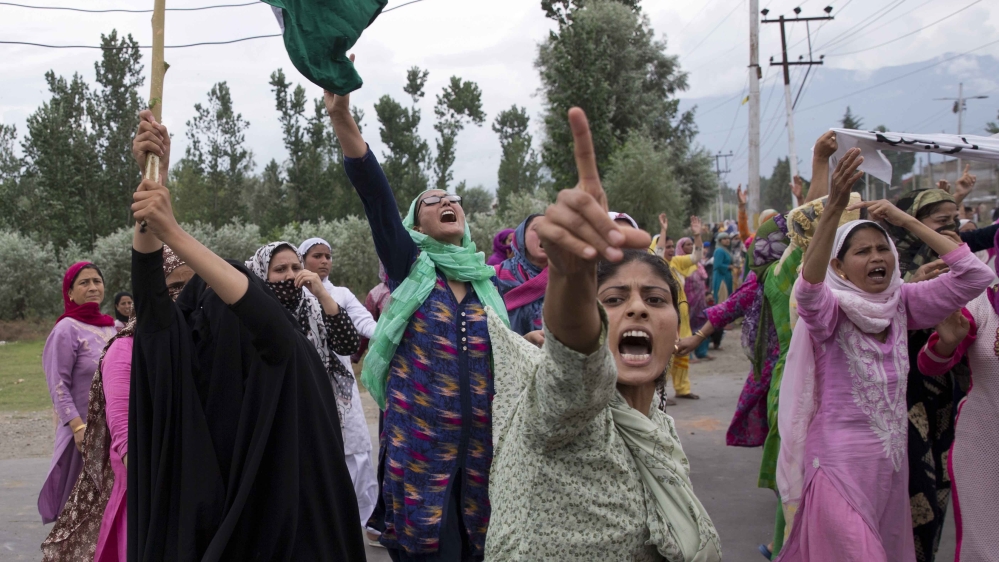
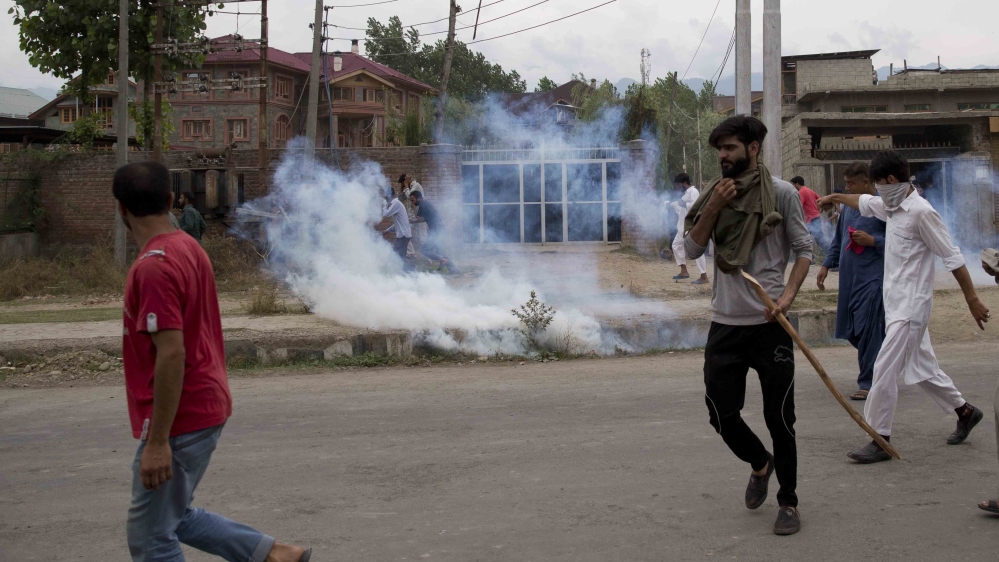
Ban on public gatherings lifted in Jammu, schools to reopen
The magistrate for Jammu district in Indian-administered Kashmir said all schools in the Hindu-majority area “may resume their functioning” from Saturday onwards.
The statement by Sushma Chauhan also lifted a ban on gatherings of more than four people in the district.
Friday prayers held in Kashmir amid tight security
Local media posted videos and photos from Indian-administered Kashmir showing dozens of people walking on the streets of Srinagar for the first time this week to offer prayers at mosques guarded by police.
The main Jama Masjid mosque in Srinagar’s old quarter was closed, however, with policemen in riot gear posted every few metres around the building. One officer said he faced regular attacks from young people throwing stones.
“Every time we have embraced India, they have cut our throats,” read a handwritten poster at another mosque, which also urged Kashmiris not to sell land and to hold protests after Eid prayers on Monday.
Jammu and Kashmir: Locals arrive at a mosque in Doda to offer Friday prayers. pic.twitter.com/kcgi4zN3p1
— ANI (@ANI) August 9, 2019
#WATCH Jammu and Kashmir: Locals arrive at a mosque in Srinagar to offer Friday prayers. pic.twitter.com/HRzWkULtfY
— ANI (@ANI) August 9, 2019
Pellet gun attack victims fighting for their lives
Witness reports emerged of Indian troops using excessive force on protesters in Indian-administered Kashmir, causing life-threatening injuries.
“The government will deny these injuries as there is no proper reporting or documentation of these incidents. We won’t be able to know about most of the casualties.”
Read the detailed report here.
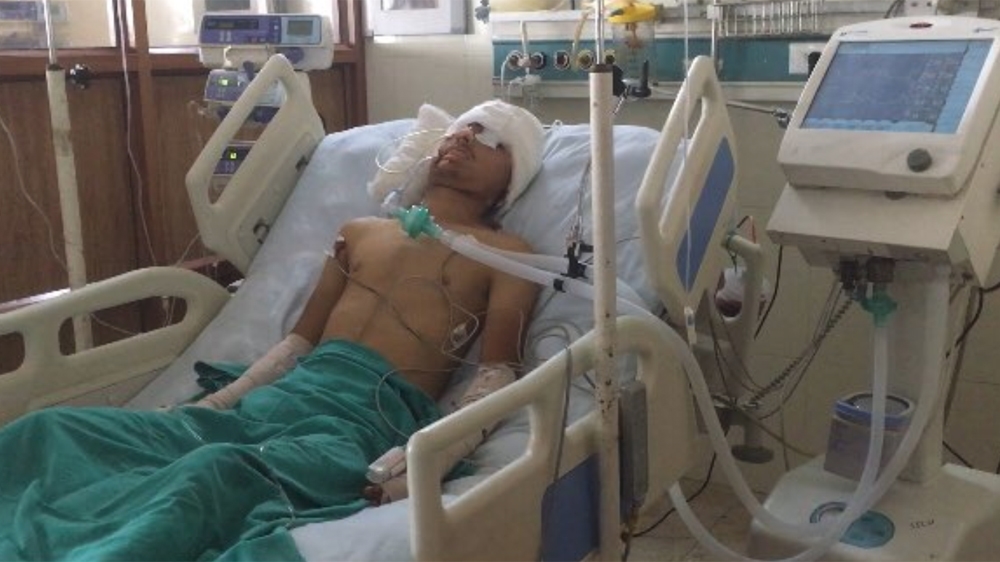
Thar Express shut down by Pakistan
Pakistan said it will halt the last train service running to India.
“We have decided to shut down the Thar Express as well,” Pakistan’s Federal Minister for Railways Sheikh Rasheed told reporters.
On Thursday, Pakistan suspended the Samjhauta Express, its main train service to India, and banned Indian films.
Protests expected in Pakistan, Srinagar
Authorities in Pakistan and Srinagar in Indian-administered Kashmir are bracing for protests on Friday.
Al Jazeera’s Kamal Hyder, reporting from Islamabad, said two protests were scheduled in the Pakistani capital after Friday prayers.
“Organisers of one protest have threatened to march to the Indian High Commission which is located in Islamabad’s red zone,” he said.
Priyanka Gupta, reporting for Al Jazeera from New Delhi, said the government was monitoring the situation in Kashmir very closely.
“The Friday prayers took place under heavy security. There have been sporadic clashes in the last four days but we’re expecting more protests happening later on Friday,” she said.
Demonstrations against India’s move in Kashmir have been taking place around the world.
@BJI_Official Protests On #Kashmir issue. #Chittagong#Bangladesh#KashmirWantsFreedom #KashmirUnderThreat #EndKashmirBlockade @OIC_OCI pic.twitter.com/PMylvbryWa
— Atik Liman (@atikul_liman) August 9, 2019
Great to join fellow Kashmiris here in Manchester yesterday to protest against the revocation of #Article370 by India. We need to ensure that the people in Kashmir are able to live freely, and be given back their rights! #StandwithKashmir pic.twitter.com/36nvKoiGKW
— Afzal Khan MP (@Afzal4Gorton) August 9, 2019
Thousands flee border villages along LoC
Thousands of villagers living along the heavily militarised Line of Control (LoC) dividing Pakistan- and Indian-administered Kashmir have migrated to safer places fearing artillery fire exchanges across the border.
“There is fear in the area and residents are preparing to leave their homes if a cross-border exchange of fire takes place. The LoC is just three kilometres from where we are,” Muhammad Mukhtar, a 38-year-old vet, told Al Jazeera.
Read more here.
Curfew to be eased for Friday prayers
The strict curfew in Kashmir that has entered a fifth day was eased for Friday prayers, according to the police chief.
“People will be allowed to go to the area-specific mosques for the prayers in most parts of the Srinagar city,” the region’s police chief, Dilbagh Singh, told The Associated Press.
The relaxing of the curfew was temporary but a precise timeframe was not given.
Pakistan FM visiting ‘trusted friend’ China over Kashmir
Pakistan’s Foreign Minister Shah Mahmood Qureshi is visiting China as part of efforts to pressure India to reverse its decision to revoke the special status of the disputed region of Kashmir.
Shah Mahmood Qureshi will meet with Chinese leaders on Friday. Before leaving for Beijing, Qureshi said he will apprise Islamabad’s “trusted friend” about the situation.
Pakistan says it is considering a proposal to approach the International Court of Justice over India’s action.
|
|
Kashmir’s streets silent as people’s despair and rage grow
Silence cloaked the centre of Srinagar on Friday, its once-teeming streets blocked with spools of concertina wire. Every road was sealed off. The population forced to remain indoors while thousands of Indian soldiers in camouflage were on patrol, carrying guns at their waists.
Friday marked the fourth day since the main city in Indian-administered Kashmir was under siege.
Muslim worshippers were expected to attend Friday prayers at mosques across the region later on Friday.
|
|
Thursday, August 8
UN urges ‘maximum restraint’ amid Kashmir row
Antonio Guterres, the secretary-general of the UN, has appealed for “maximum restraint” as tensions escalate between India and Pakistan over New Delhi’s move on Kashmir.
Recalling the 1972 Simla Agreement, in which New Delhi and Islamabad committed to bilateral negotiations to resolve their dispute over Kashmir, Guterres called on “all parties to refrain from taking steps that could affect” the region’s status.
In his statement, Guterres also expressed concern over reports of “restrictions on the Indian-side of Kashmir”, saying they could exacerbate the human rights situation in the region.
|
|
Some government offices and schools to reopen in Kashmir
India’s ANI news agency said Indian-administered Kashmir’s top civil servant has ordered government employees “who are working at divisional level, district level and those serving in civil secretariat, to report back to their duties with immediate effect”.
All schools in the southern district of Samba will also reopen on Friday, the agency said, citing an official statement.
J&K Government: It is further intimated that necessary arrangements regarding smooth and secure working environment for the employees have been made by the administration. https://t.co/DmurPKjb6T
— ANI (@ANI) August 8, 2019
Modi says ‘new era’ has begun in Kashmir
India’s Prime Minister Narendra Modi has pledged a “new era” of economic growth in Kashmir following his government’s decision to strip the territory of its special rights.
But in his first address to the nation since the move, Modi did not address the four-day-long security lockdown or communications blackout in the region.
He described Article 370 as an “obstacle” to the region’s development and said the decision to abolish the provision will free Kashmir from “terrorism and separatism”.
The move will also create new jobs and sports opportunities for Kashmir’s youth, Modi said, also pledging to develop the region’s film and herbal medicine industries.
Analysis: ‘Widespread support’ in India for BJP’s Kashmir move
Shruti Kapila, lecturer in history at the Cambridge University in the UK, said there was “widespread popular support” in India for the ruling Bharatiya Janata Party’s (BJP) decision to scrap disputed Kashmir’s special status.
The move was a key campaign pledge of the BJP, which registered a landslide victory in the general election in April- May, she noted. “This mandate was sought on the back of national security after the Pulwama attack in mid-February,” she said, referring to a suicide attack that killed at least 40 Indian soldiers in Indian-administered Kashmir.
“Both in the upper and lower houses of parliament, there was very little in the nature of resistance .. by and large, there has been cross-party consensus, even by smaller regional parties who may feel threatened by such a precedent which strengthens the hands of central powers in India,” she said from New Delhi.
“Secondly, I also think the trigger point is also the moving away of the United States from this region … There is no real international multilateral body to which this can be addressed to,” she added.
Pakistan to ban Indian films over Kashmir tension
Pakistan has said it would ban the screening of Indian films in the country’s cinemas, as tensions between the two countries rise over the contested Kashmir region.
“No Indian cinema will be screened in any Pakistani cinema. Drama, films and Indian content of this kind will be completely banned in Pakistan,” Firdous Ashiq Awan, an adviser to Pakistan’s Prime Minister Imran Khan, said in a tweet.
Pakistan suspends train service to India
Pakistan has said it would suspend a rail service linking it to India, as relations with its arch-rival continue to sour over the contested Kashmir region.
“We have decided to shut down Samjhauta Express,” Minister of Railways Sheikh Rasheed said, referring to the train running to India’s capital New Delhi from the Pakistani city of Lahore.
“As long as I am [the] railways minister, Samjhauta Express can’t operate.”
Kashmir an ‘internal affair’, India tells Pakistan
India has hit back at Pakistan’s downgrading of diplomatic ties over its clampdown on Kashmir, saying its decision to strip the restive region of its autonomy was an “internal affair”.
“The recent developments pertaining to Article 370 are entirely the internal affair of India,” the Ministry of External Affairs said in a statement.
“Seeking to interfere in that jurisdiction by invoking an alarmist vision of the region will never succeed.”
|
|
No phone calls, no groceries: Kashmir on edge under lockdown
The unprecedented security lockdown amid a near-total communications blackout has entered a fourth day in Indian-administered Kashmir, with tens of thousands of forces in riot gear patrolling the region.
Streets lined with shuttered shops were deserted while steel barricades and razor wire cut off neighbourhoods, AP news agency said. Shopping malls, grocery stores and even clinics were closed.
Due to the communication blackout – with landlines, mobile phones and internet all down – people can’t call one another or speak to friends and relatives outside the region.
Activist files petition challenging Kashmir clampdown
An opposition activist has filed a petition in India’s Supreme Court challenging the communications blackout and security clampdown in Indian-administered Kashmir, where people remained holed up in their homes for a fourth day.
Petition filed in SC by Tehseen Poonawalla seeking withdrawal of curfew, blocking of phone lines, internet, news channels & other restrictions from #JammuAndKashmir. The plea also seeks "immediate release of political leaders from illegal custody". Plea will be mentioned today pic.twitter.com/NJ8UhfYB4C
— ANI (@ANI) August 8, 2019
The plea also sought “immediate release” of political leaders under custody, including two former Jammu and Kashmir chief ministers.
State-run All India Radio said security agencies have arrested more than 500 people in the disputed region apparently to prevent any outbreak of violence.
India’s splitting of Kashmir opposed in border city of Kargil
India’s move to carve out Ladakh from the state of Jammu and Kashmir to make it a “union territory” has been met with protests in Kargil, a Muslim-majority border city in Ladakh that identifies culturally with Kashmir.
Kargil’s religious and political organisations released a statement, condemning the Indian government for acting “without the consent from the people”. The groups called for a shutdown on Tuesday.
Kargil’s Imam Khomeini Memorial Trust, an influential religious group in the region, supported the protest.
Kashmir has a violent past that pre-dates the partition of India and Pakistan. The Kashmir conflict — explained. pic.twitter.com/KxfQKZZBhB
— Al Jazeera English (@AJEnglish) February 27, 2019
Wednesday, August 7
US supports direct dialogue between Pakistan, India on Kashmir
The US on Wednesday said it supports direct dialogue between India and Pakistan on the disputed Kashmir region and called for calm and restraint as the dispute escalated.
“We continue to support direct dialogue between India and Pakistan on Kashmir and other issues of concern,” a US State Department spokeswoman said in a statement.
Kashmiris anxious over food, cash shortages
Residents of Indian-administered Kashmir’s main city, Srinagar, have expressed concern over food and currency shortages because of the continuing security lockdown.
Muneer Ahmad, who owns a shop at the Jahangir Chowk, said he was running out of essential goods.
“Whatever old stock we had we sold that and now we are running out of stock like milk, flour, and the way security has been placed on roads,” he said. “This seems to be a long curfew where people will starve.”
Most ATMs in the city were also not working, residents said.
India ‘did not consult US’ over Kashmir move
The US has denied media reports that New Delhi had consulted Washington before revoking Kashmir’s special status.
Alice Wells, acting assistant secretary at the Bureau of South and Central Asian Affairs, said in a Twitter post: “Contrary to press reporting, the Indian government did not consult or inform the US government before moving to revoke Jammu and Kashmir’s special constitutional status.”
Contrary to press reporting, the Indian government did not consult or inform the US Government before moving to revoke Jammu and Kashmir’s special constitutional status. – AGW
— State_SCA (@State_SCA) August 7, 2019
UK expresses concern to India over Kashmir
Britain’s Foreign Secretary Dominic Raab said he had expressed concern to his Indian counterpart about the situation in the disputed Kashmir region.
“I have spoken to the Indian foreign minister,” Raab said. “We’ve expressed some of our concerns around the situation and called for calm, but also had a clear readout of the situation from the perspective of the Indian government.”
Pakistan to expel Indian ambassador
Shah Mahmood Qureshi, Pakistan’s foreign minister, said Islamabad would expel India’s ambassador Ajay Bisaria.
Moin-ul-Haq, Pakistan’s newly-appointed ambassador to India, had yet to take up his post but will now not move to New Delhi, Qureshi added in televised comments.
Pakistan to downgrade ties with India over Kashmir move
Pakistan said it will “downgrade” diplomatic relations and suspend bilateral trade with India after New Delhi stripped its portion of the contested Kashmir region of special status.
The move follows a meeting of Pakistan’s National Security Committee, led by Prime Minister Imran Khan, according to an official statement posted on Twitter.
1-Downgrading of diplomatic relations with India.
2-Suspension of bilateral trade with India.
3-Review of bilateral arrangements.
4-Matter to be taken to UN, including the Security Council.
5-14th of August to be observed in solidarity with brave
Kashmiris. #StandwithKashmir pic.twitter.com/v06GmMc5lG— Govt of Pakistan (@pid_gov) August 7, 2019
Protesting India’s “unilateral” and “illegal” actions in Kashmir, Islamabad said it would also raise the issue with the United Nations Security Council.
Khan also directed Pakistan’s armed forces to “continue vigilance”.
Protester dies, scores arrested in Kashmir lockdown
A protester died after being chased by police and more than 100 people were arrested during a curfew in Kashmir’s main city after the restive region’s autonomy was scrapped by India, officials told AFP news agency.
Despite a paralysing curfew imposed to head off unrest, sporadic protests have been reported by residents in the main city, Srinagar. A police official, speaking on condition of anonymity, told AFP that in one incident a youth being chased by police “jumped into the Jhelum River and died”.
A source told AFP that at least six people had been admitted to hospital in Srinagar with gunshot wounds and other injuries from protests.
|
|
Workers leave Kashmir valley after lockdown
Thousands of workers from north Indian states have left Indian-administered Kashmir over the last three days following an unprecedented lockdown of the Himalayan valley.
![People from various parts of India wait at a bus terminal during restrictions as they wait to leave Srinagar [Zubair Sofi/Al Jazeera]](/wp-content/uploads/2019/08/01b780def187451c9de0fc6e222db5c2_18.jpeg)
![People from various parts of India wait at a bus terminal during restrictions as they wait to leave Srinagar [Zubair Sofi/Al Jazeera]](/wp-content/uploads/2019/08/4be058f1dbb848f899554c5e42bf45f3_18.jpeg)
Kashmir journalists struggle to tell their stories
Restrictions on movement and a communications blackout for a third day in Indian-administered Kashmir have frustrated the region’s journalists.
Most English and Urdu language newspapers based in the main city of Srinagar have not published their editions since Monday.
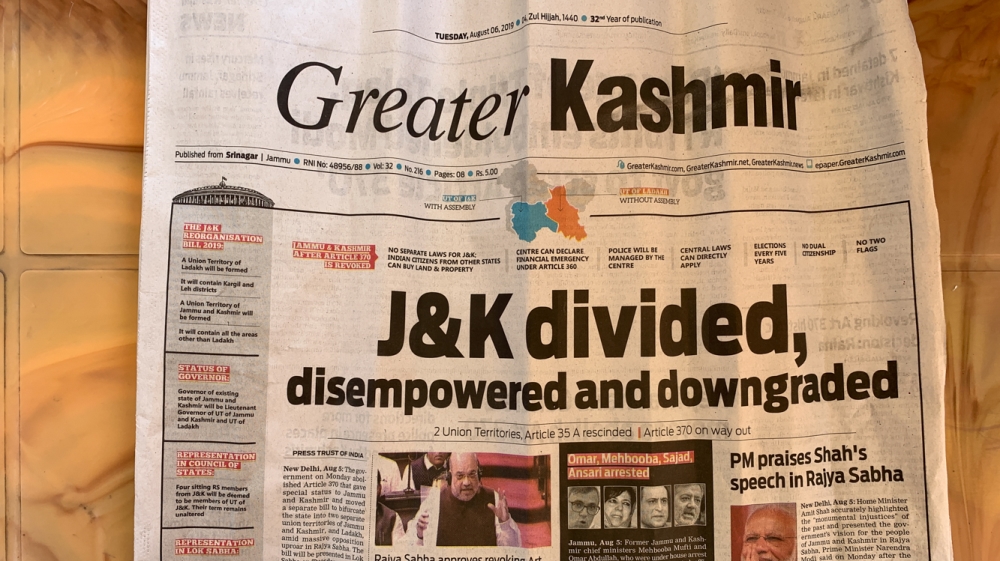
“I tried to take some photos and videos, but the deployed forces stopped me. They asked me to shut my camera,” a news reporter told Al Jazeera.
Read more here.
Activists arrested, journalists fear for safety
Many activists were arrested in Indian-administered Kashmir, sources told Al Jazeera from Srinagar.
Journalists already struggling to get information about the disputed region out because of a communications blackout, said they fear for their safety.
One reporter told Al Jazeera on the condition of anonymity that his name was on a list of people who were to be arrested.
Sporadic protests in Srinagar amid lockdown
Knots of young protesters threw stones at soldiers, police and a witness said, amid anger over the telecommunications clampdown that began on Sunday.
|
|
Streets in the region’s main city of Srinagar were deserted for a third day, with almost all shops shut, barring some chemists.
Armed federal police manned mobile checkpoints across the city, limiting people’s movement.
“These [protests] are mostly localised because of the heavy troop deployment,” a police officer who sought anonymity because he was not authorised to speak to the media, told Reuters news agency, adding that police used tear gas and pepper spray to scatter the protesters.
Kashmiris mourn loss of autonomy
![Kashmir Curfew [Baba Tamim/Al Jazeera]](/wp-content/uploads/2019/08/5de25ca1ffea4f65b6477730513637f9_18.jpeg)
Residents of Srinagar in Indian-administered Kashmir lamented India’s decision to scrap the region’s special status but promised to resist the move.
Al Jazeera spoke with almost a dozen locals who said they feared demographic changes would now be inevitable in the Muslim-majority region.
Ghulam Mohammad Mir, a 42-year-old ambulance driver said: “Our honour has been sacrificed. When I heard about the abrogation of the terms of accession I felt like I have lost a part of my body. Kashmir is not going to remain the same area.”
Read more here.
What are Articles 370 and 35A?
Article 370 was the basis of Jammu and Kashmir’s accession to the Indian union at a time when erstwhile princely states had the choice to join either India or Pakistan after their independence from British rule in 1947.
Article 35A was introduced through a presidential order in 1954 to continue the old provisions of the territory regulations under Article 370 of the Indian constitution.
Read our explainer.
UN ‘deeply concerned’ over Kashmir curfew
The UN has expressed concern over the significant security lockdown, telecommunication restrictions and the arbitrary detention of political leaders in Indian-administered Kashmir.
“What we are witnessing now in Indian-administered Kashmir takes what was already a bit of a pattern to a new level,” said UN human rights spokesman Rupert Colville at a press briefing in Geneva.
“We are deeply concerned that the latest restrictions will exacerbate the human rights situation in the region,” he added.
|
|
Redrawn map will transform Kashmir: Experts
The Indian government’s decision to split the state of Jammu and Kashmir into two union territories will lead to a major transformation of the socioeconomic landscape in the Muslim-majority Himalayan region, according to critics and experts.
“The decision (to split the region) will reduce Kashmir to a colony,” A G Noorani, a constitutional expert, told the Associated Press news agency.
“It will divide Kashmir from the rest of the country and Kashmiris will oppose the Hindu feeling in the region,” he said.
Dibyesh Anand, a social scientist at the University of Westminster, said: “The fear of settler colonialism is not a spectre but a reality, given the approach of both the government and a large number of Indians.”
Tuesday, August 6:
EU urges India, Pakistan to avoid escalation
The European Union said that it was closely monitoring the situation and called for the avoidance of escalation of tensions in the region.
“Our main message here is that it is very important to avoid any escalation of tension in Kashmir and in the region,” Carlos Martin Ruiz de Gordejuela, an EU spokesman for foreign affairs, told a news conference.
He noted that the issue has legal and political dimensions.
Turkey seeks to reduce tension
Turkey is closely following the “worrying” developments, President Recep Tayyip Erdogan said.
Erdogan’s remarks came at Turkey’s 11th Ambassadors’ Conference in Ankara, where Turkish diplomats and foreign mission officials gather annually to discuss foreign policy.
Erdogan said he had a “fruitful” phone conversation with Pakistani Prime Minister Imran Khan and that Ankara would get in touch with India’s Prime Minister Narendra Modi in hopes to reduce tension mounting in the region.
Organisation of Islamic Cooperation expresses concern
The Organisation of Islamic Cooperation (OIC) Contact Group on Jammu and Kashmir has expressed “deep concern” over the recent developments.
In a statement at an emergency meeting held in Jeddah, Saudi Arabia, the secretary-general, Yousef bin Ahmed al-Othaimeen, reaffirmed the OIC’s “support to the people of Jammu and Kashmir in their just struggle to achieve their legitimate rights, in particular the right to self-determination”.
Pakistani Foreign Minister Shah Mahmood Qureshi said that Indian steps which “interfere with the demography of Indian-administered Kashmir and the disputed status are a grave, destabilising threat to the already volatile situation in South Asia and would have serious implications”.
The Contact Group condemned India’s “illegal and unilateral” steps and urged New Delhi to allow access to its Independent Permanent Human Rights Commission (IPHRC) and other international rights bodies to Indian-administered Kashmir in order to “independently verify the gross and blatant human rights violations”.
Modi says a ‘new dawn’ awaits Kashmir
Indian Prime Minister Modi described the passage of the legislation as a “momentous occasion” in a parliamentary democracy.
In a series of tweets, Modi said: “I salute my sisters and brothers of Jammu, Kashmir and Ladakh for their courage and resilience. For years, vested interest groups who believed in emotional blackmail never cared for people’s empowerment. J&K is now free from their shackles. A new dawn, better tomorrow awaits!”
Modi also said his government had fulfilled a long-standing demand of the people of Ladakh, Kashmir’s mostly Buddhist region, to be declared a territory of India’s union.
“Special congratulations to the people of Ladakh!,” Modi tweeted.
“This decision will give impetus to the overall prosperity of the region and ensure better developmental facilities.”
India tells China Kashmir is ‘internal matter’
India warned China that Ladakh’s new designation as a “union territory” is an “internal matter” after Beijing slammed India’s “unilateral” decision.
“India does not comment on the internal affairs of other countries and similarly expects other countries to do likewise,” Indian foreign ministry spokesman Raveesh Kumar said.
China: India’s move undermines our sovereignty
China expressed serious concern and called for maintaining the status quo in the disputed region.
“[India and Pakistan] should refrain from taking actions that will unilaterally change the status quo and escalate tensions,” said Chinese foreign ministry spokeswoman Hua Chunying.
“We call on both India and Pakistan to peacefully resolve the relevant disputes through dialogue and consultation and safeguard peace and stability in the region,” Hua said.
The Kashmir issue “is an issue left from the past between India and Pakistan,” she said. “The relevant sides need to exercise restraint and act prudently.”
Beijing also criticised India’s “unilateral” decision to turn Kashmir’s mostly Buddhist region of Ladakh into an administrative territory directly ruled by New Delhi.
“China is always opposed to India’s inclusion of the Chinese territory in the western sector of the China-India boundary into its administrative jurisdiction,” Hua said.
“Recently India has continued to undermine China’s territorial sovereignty by unilaterally changing its domestic law. Such practice is unacceptable and will not come into force.”
India says China is illegally occupying 38,000sq km of its northwestern territory, while Beijing claims a 90,000sq km chunk of Arunachal Pradesh state in northeast India.
India’s parliament approves resolution revoking Kashmir of its status
India’s parliament approved a resolution revoking Kashmir’s special status and cleared a bill to split the disputed state.
The resolution, backing Monday’s decree to abolish Article 370 of the Indian constitution, was adopted by the lower house of parliament.
The “Jammu and Kashmir Reorganisation Bill” that splits the state into two territories directly governed by New Delhi was passed by 370 parliamentarians voting for the legislation, and 70 against.
The two crucial motions have now been ratified by both the houses of parliament – with the upper house approving the measures on Monday.
“Together we are, together we shall rise and together we will fulfill the dreams of 130 crore [1.3 billion] Indians,” Modi tweeted after parliament approved the move.
Khan calls for international intervention
Pakistani Prime Minister Khan said his government would challenge the Indian move to change the constitutional status of Indian-administered Kashmir at the UN Security Council, urging the international community to intervene in the crisis or risk regional destabilisation.
“We will raise this at every level, at the United Nations Security Council,” said Khan, addressing a joint session of Pakistan’s parliament in the capital, Islamabad.
“We are thinking of how we can go to the [International Court of Justice] through the UN Security Council … we will raise this issue at every forum.”
Read more here.
|
|
Pakistan army will ‘go to any extent’ to support Kashmir
Pakistan’s army chief said the country’s military will “go to any extent” to support people in the contested region after India’s move,
“Pakistan army firmly stands by the Kashmiris in their just struggle to the very end,” General Qamar Javed Bajwa said following a meeting with top commanders in Rawalpindi.
“We are prepared and shall go to any extent to fulfil our obligations in this regard,” he added, without elaborating further.
India’s lower house debates bill to split Kashmir
The lower house of India’s parliament was set to ratify the bill downgrading the governance of the Indian-administered portion of Kashmir.
Members of the Lok Sabha were debating the “Jammu and Kashmir Reorganisation Bill” a day after the legislation was introduced alongside the presidential decree revoking Article 370.
The bill downgrades the region from a state into two federally administered union territories: Jammu and Kashmir as well as Ladakh. Jammu and Kashmir would still have its own legislature, while Ladakh would not.
Read more here.
Kashmir on edge as India tightens grip on disputed region
A communications blackout and a security lockdown in Indian-administered Kashmir prompted anger and fear among residents.
Sheikh Mushtaq, 55, said he has lost contact with his daughter who was forced to leave her university in southern Jammu on Monday because of the lockdown. “We are helpless,” he said.
The security measures have also hit businesses hard before the Muslim celebration of Eid al-Adha.
Read more here.